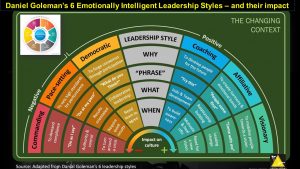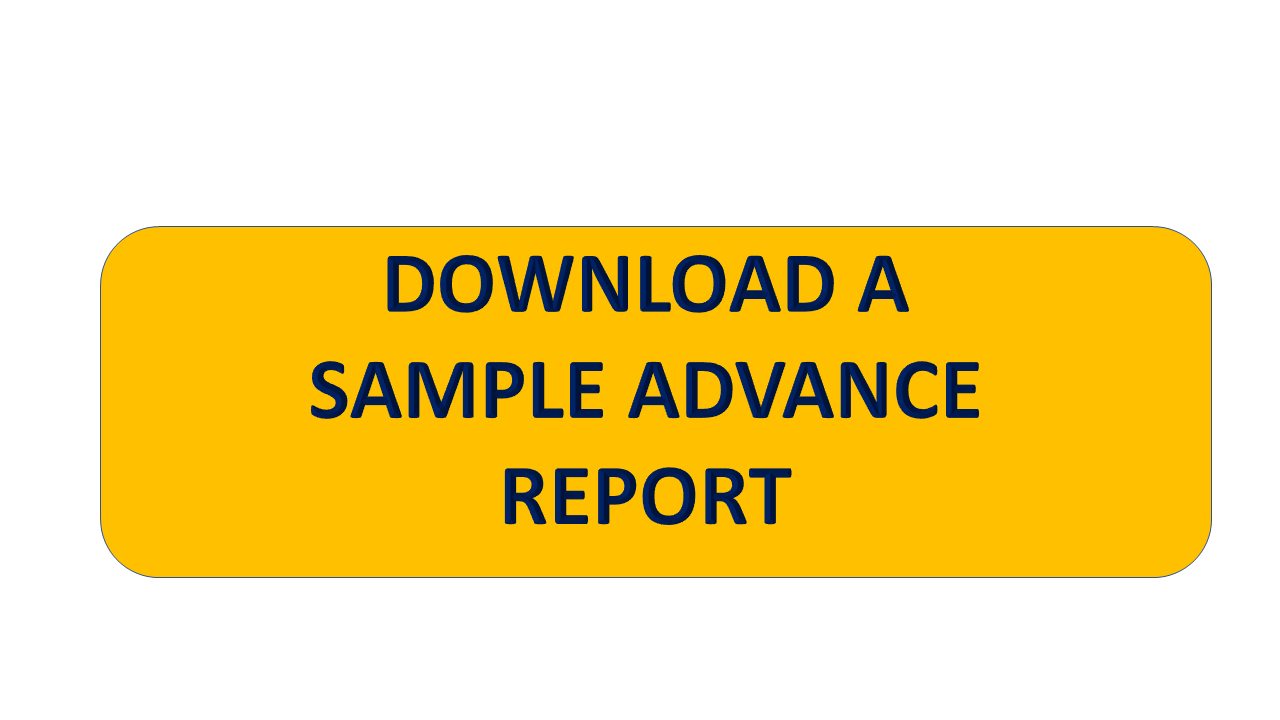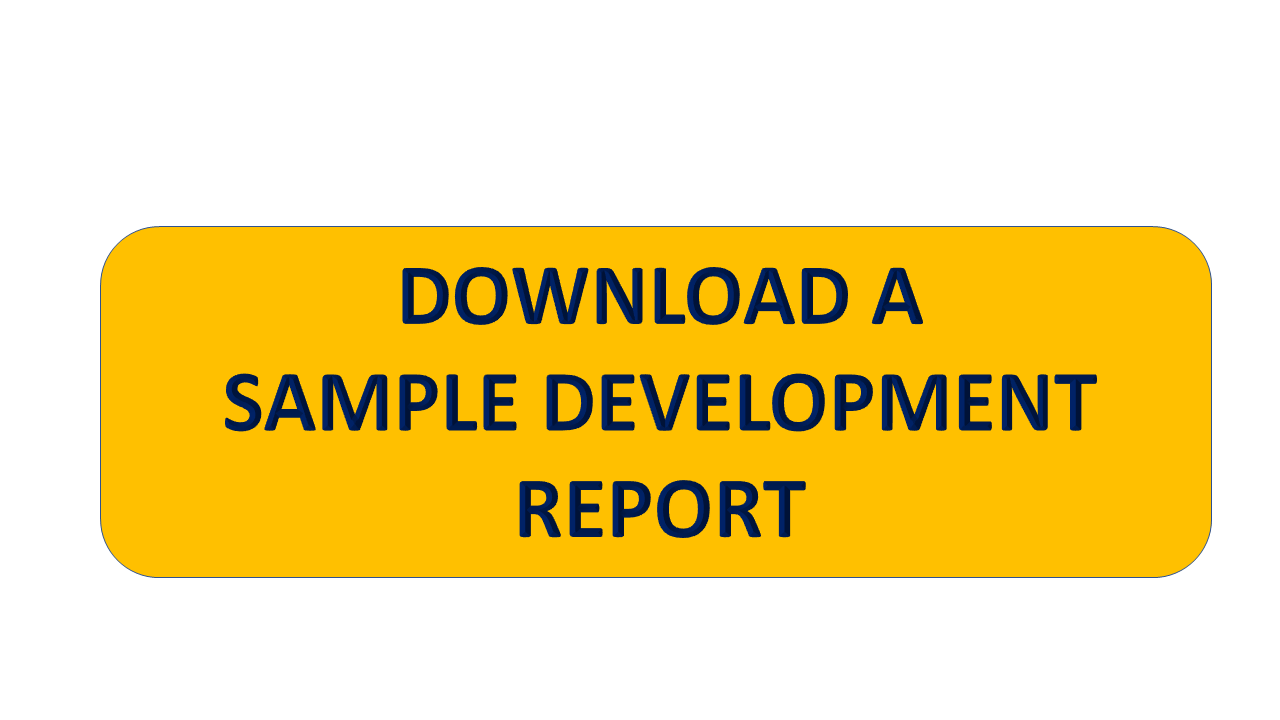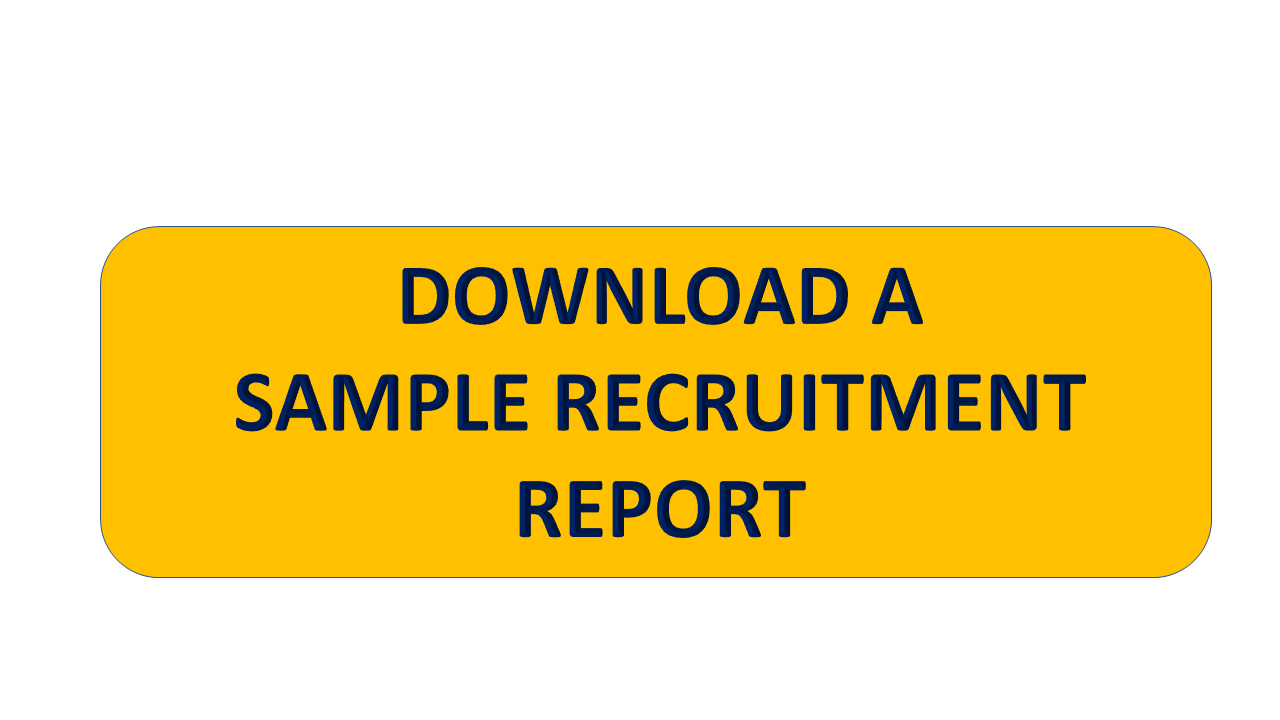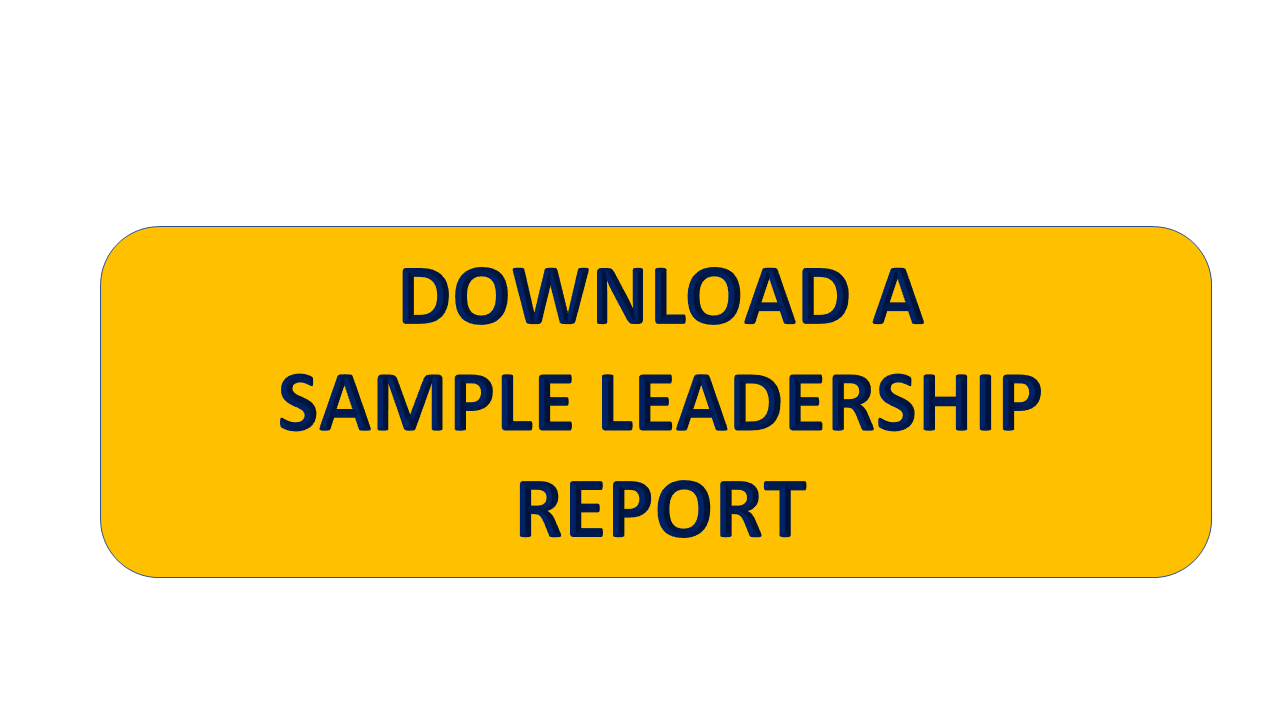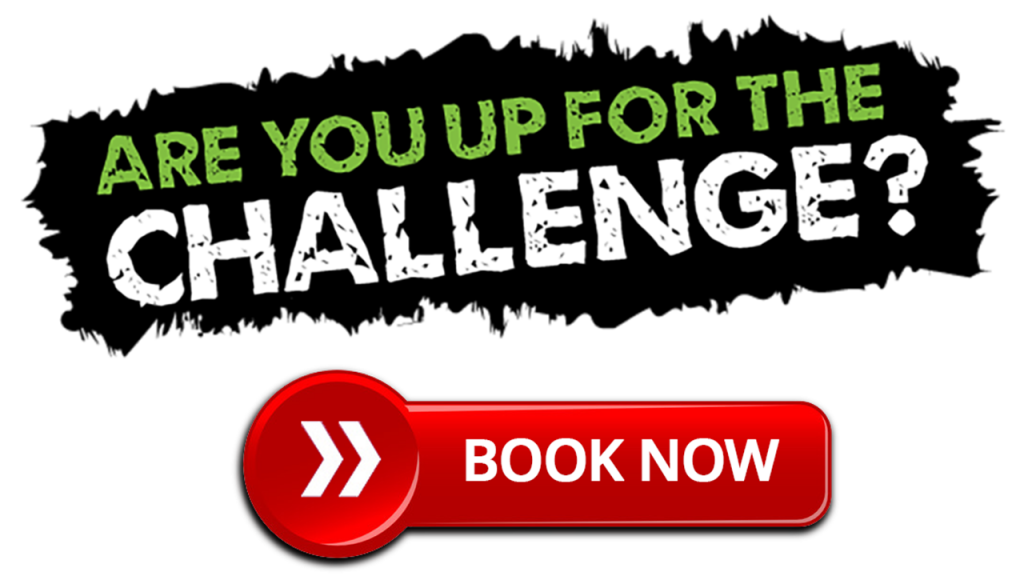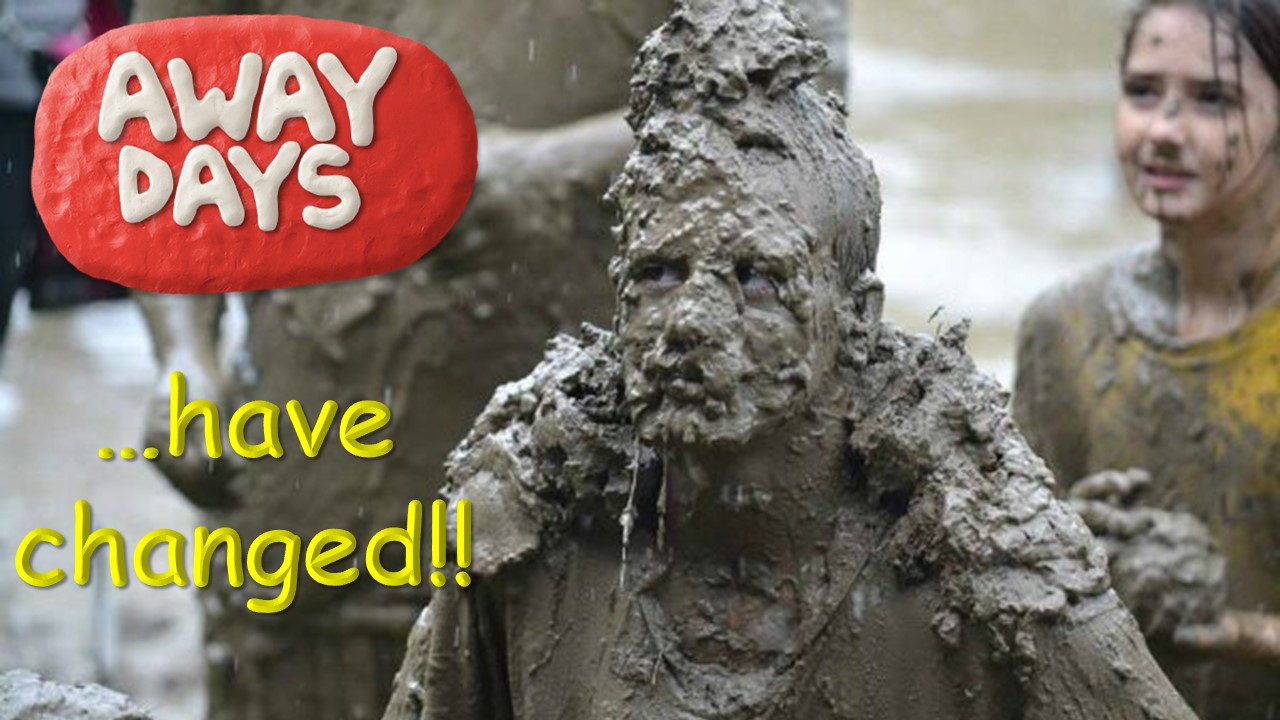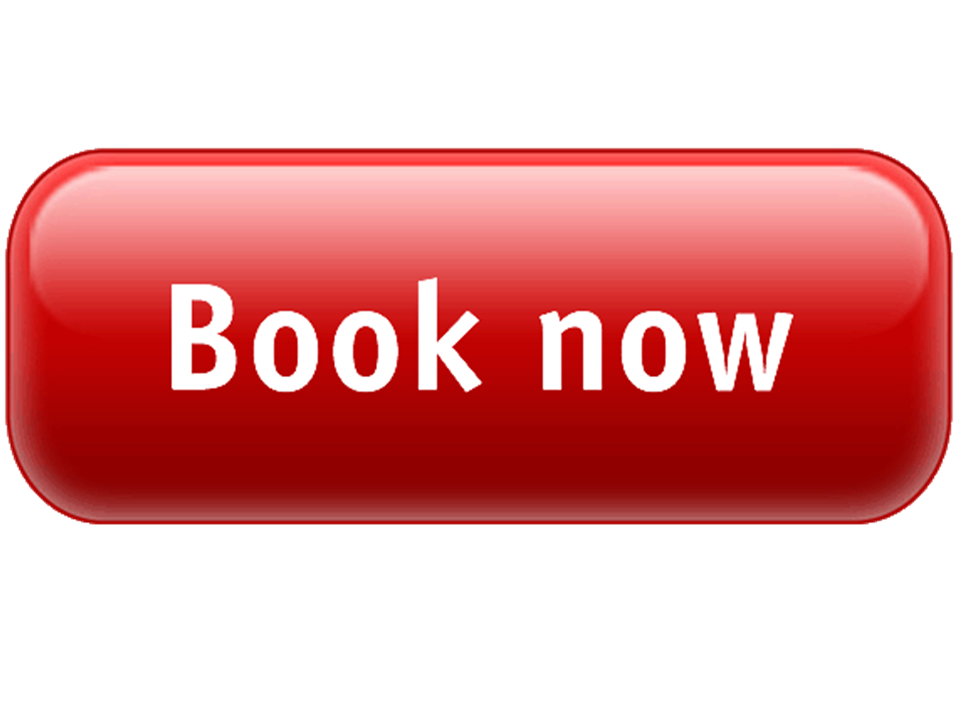mtceurope
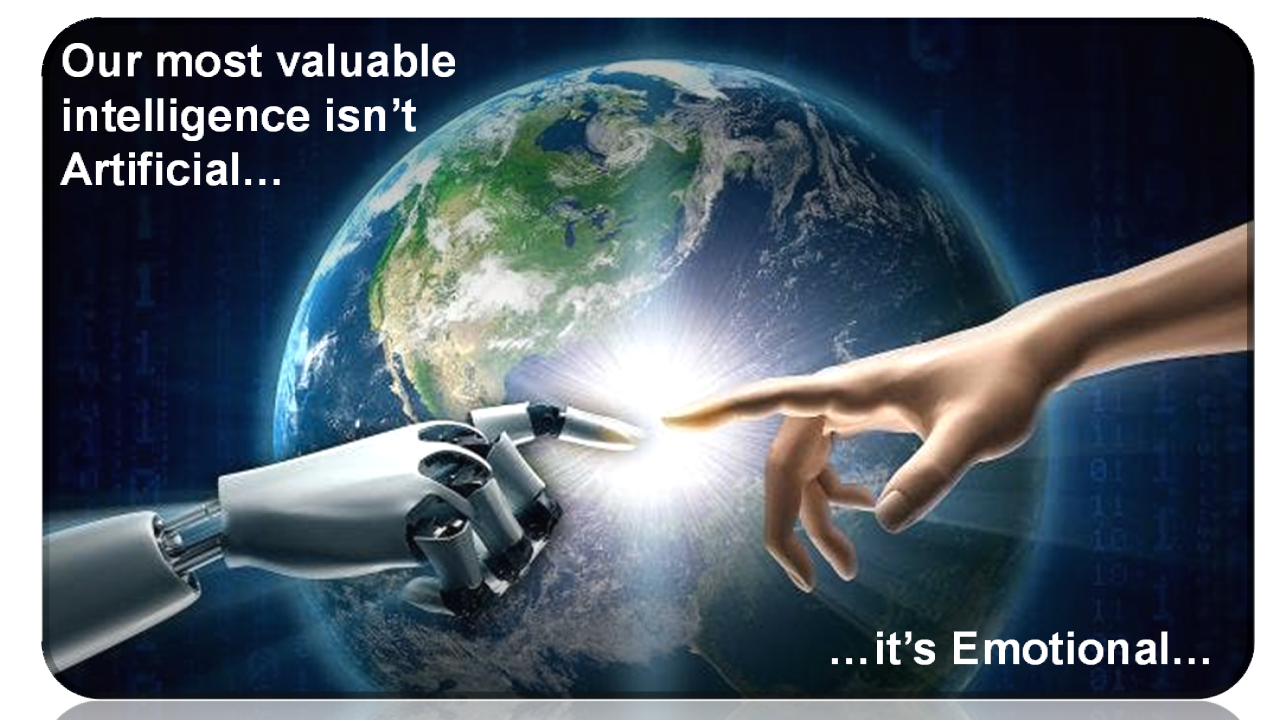
Do you want to?:
- Build your team’s impact within your organisation?
- Optimise the efficiency of your Senior Management Team?
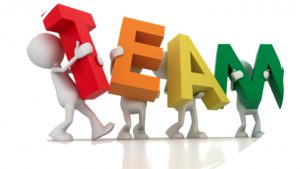
- Resolve deep routed issues between team members?
- Understand the emotional behaviours behind capability?
- Get disruptive teams to work well together?
- Have clear action plans for high performing teams?
- Create a Shared Vision and Strategic Plan for your Team based on individual skill sets?
- Measure exactly HOW Emotionally Intelligent your Team is?
Perhaps you can’t quite assess why it is that a Group of Great People are, sometimes, unable to make a Great TEAM?
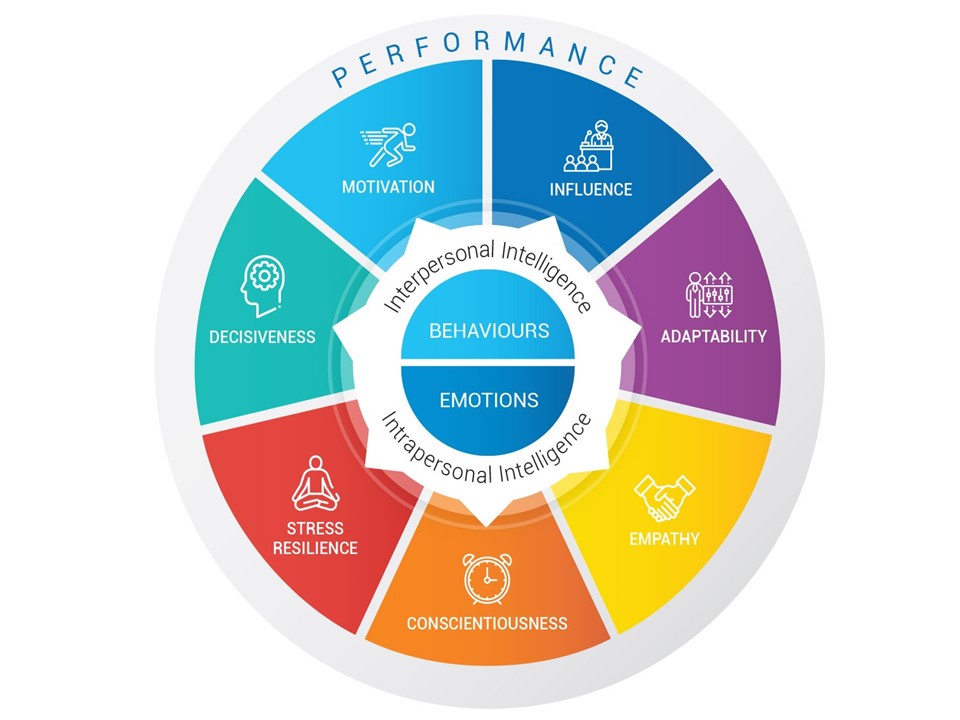
The Harvard Business Review has hailed emotional intelligence as “a  ground-breaking, paradigm-shattering idea, one of the most influential business ideas of the decade.”
ground-breaking, paradigm-shattering idea, one of the most influential business ideas of the decade.”
Emotional intelligence or EI is the ability to recognise, understand and handle your own emotions, and those of the people around you. A development of Self Awareness and Other Awareness makes E.I. the critical personal development tool for those wanting to excel at Leadership and those wanting to create or participate in High Performing Teams. How do your E.I. Behaviours and Attitudes stack up against these 8 Emotional Intelligence characteristics? People with a high degree of emotional intelligence know what they are feeling, what their emotions mean, and how these emotions can affect other people.
Perhaps you can’t quite assess why it is that a Group of Great People are, sometimes, unable to make a Great TEAM? Even Emotionally Intelligent SUPER Teams need regular “Effective Health Checks” and occasionally, re-visioning or re-alignment….why not book a “Service” for your Team to ensure that it’s operating at its optimum effectiveness and performance.
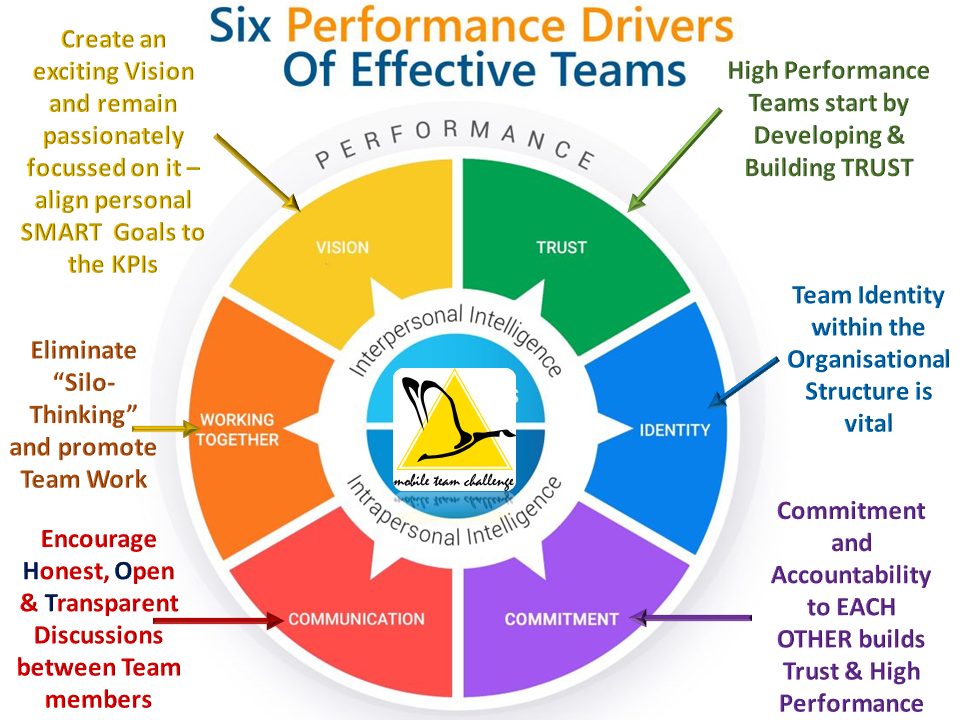
This one or two-day CPD Accredited Workshop from MTC utilises approved British Psychological Society’s Emotional Intelligence Profiling for each Team Member and will create a detailed assessment of the TEAM’s Emotional Intelligence.
In the current climate the need for imagination and innovation is greater 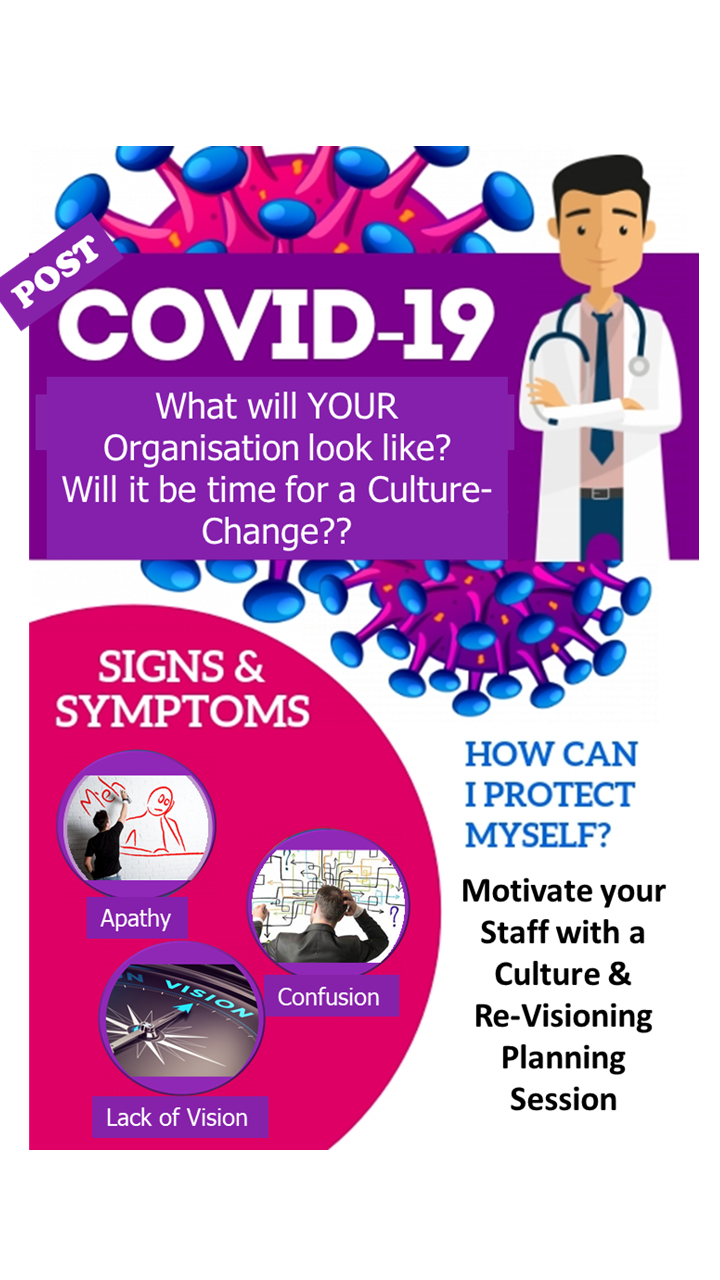 than ever.
than ever.
Small and large businesses need to adapt and shape their plans to survive and flourish in the pandemic and post-pandemic world.
But how do leaders gain trust to create the change businesses need to survive?
How do they create trust in virtual or separated teams who they need to adapt to change and innovation?
This is especially challenging in a changing world where difficult decisions that leaders need to take often result in a breakdown in trust.
And we all know that repairing trust is far, far harder than building it from the ground up could ever have been.
Building Trust in Teams
Today’s new world leaders need to be able to develop virtual team leadership that enables then to build high-trust, high-performance teams.
- The Emotional Intelligence model for effective teams provides a straightforward framework for teams to understand how their Emotional Intelligence impacts on the pyramid of core drivers, that underpin team’s performance.
- Its focus is helping teams deploy their Emotional Intelligence to build these core team drivers
- It assists the creation of shared vision and goals
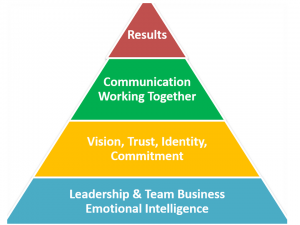
- It builds healthy trust levels
- It encourages strong commitment to team goals and aligns personal targets with the organisations’ strategic direction
- It gives High Team Identity (loyalty & accountability)
- It develops superior communication & feedback
- It gives the Team an enhanced capability to work together
By using this straightforward approach virtual or remote teams are better able to move forward, grow and overcome the significant challenges they are facing.
Click here to see a sample of an Emotionally Intelligent E-Team Profile Report
Click Here to a video to see the processes of the EBWt Team Effectiveness Interventions
Click Here for an overview of our Award-Winning Away Day Format
This CPD Accredited Workshop is available in 1-day (£895.00 + VAT + E.I. Profiles at £45.00 each) or a 2-Day Format £1,495 + VAT + £45.00 each per Individual Personal Emotional Intelligence Profile for up to 12 delegates, in-house.
Both formats include MTC’s Award Winning Experiential Learning Activities.
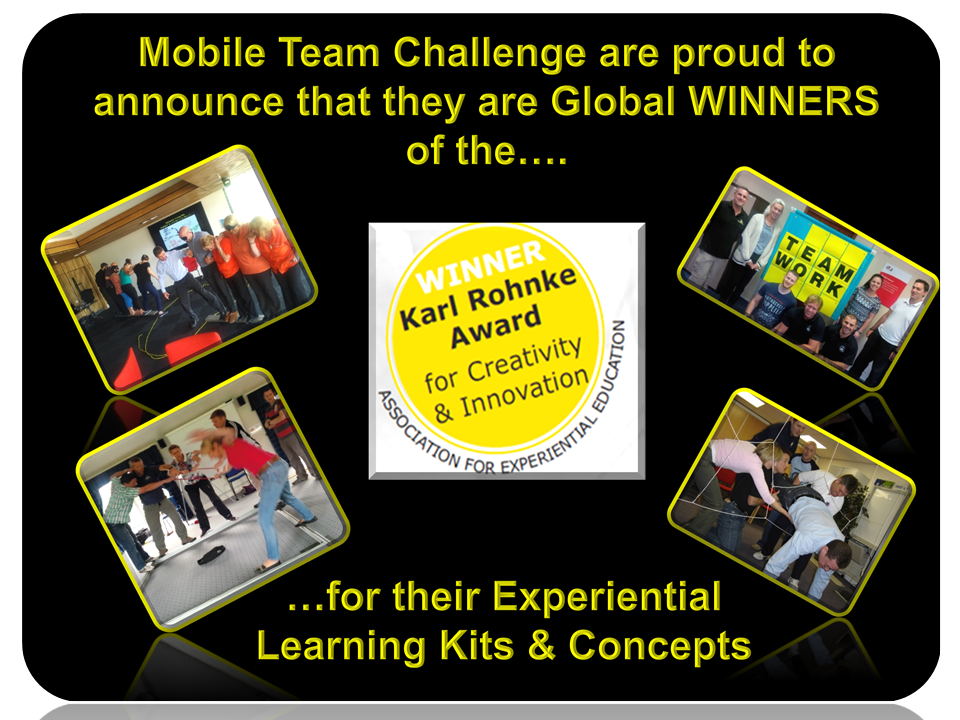
mtceurope
What type of information do you collect?
We receive, collect and store any information you enter on our website or provide us in any other way. In addition, we collect the Internet protocol (IP) address used to connect your computer to the Internet; login; e-mail address; password; computer and connection information and purchase history. We may use software tools to measure and collect session information, including page response times, length of visits to certain pages, page interaction information, and methods used to browse away from the page. We also collect personally identifiable information (including name, email, password, communications); payment details (including credit card information), comments, feedback, product reviews, recommendations, and personal profile.
How do you collect information?
When you conduct a transaction on our website, as part of the process, we collect personal information you give us such as your name, address and email address. Your personal information will be used for the specific reasons stated above only.
Why do you collect such personal information?
We collect such Non-personal and Personal Information for the following purposes:
- To provide and operate the Services;
- To provide our Users with ongoing customer assistance and technical support;
- To be able to contact our Visitors and Users with general or personalized service-related notices and promotional messages;
- To create aggregated statistical data and other aggregated and/or inferred Non-personal Information, which we or our business partners may use to provide and improve our respective services;
- To comply with any applicable laws and regulations.
How do you store, use, share and disclose your site visitors’ personal information?
Our company is hosted on the WordPress platform. WordPress provides us with a online platform that allows us to sell our products and services to you. Your data may be stored through WordPress’ data storage, databases and the general WordPress applications. They store your data on secure servers behind a firewall.
All direct payment gateways offered by WordPress and used by our company adhere to the standards set by PCI-DSS as managed by the PCI Security Standards Council, which is a joint effort of brands like Visa, MasterCard, American Express and Discover. PCI-DSS requirements help ensure the secure handling of credit card information by our store and its service providers.
How do you communicate with your site visitors?
We may contact you to notify you regarding your account, to troubleshoot problems with your account, to resolve a dispute, to collect fees or monies owed, to poll your opinions through surveys or questionnaires, to send updates about our company, or as otherwise necessary to contact you to enforce our User Agreement, applicable national laws, and any agreement we may have with you. For these purposes we may contact you via email, telephone, text messages, and postal mail.
How do you use cookies and other tracking tools?
If your website tracks personal information through the use of cookies, for example, you must make this clear to your site visitors. Be clear about what tracking tools (e.g. cookies, flash cookies, web beacons, etc.,) your website employs, what personal information they gather and why they are being used.
How can your site visitors’ withdraw their consent?
If you don’t want us to process your data anymore, please contact us at [your email] or send us mail to: [your physical mailing address].
Privacy policy updates
We reserve the right to modify this privacy policy at any time, so please review it frequently. Changes and clarifications will take effect immediately upon their posting on the website. If we make material changes to this policy, we will notify you here that it has been updated, so that you are aware of what information we collect, how we use it, and under what circumstances, if any, we use and/or disclose it.
Questions and your contact information
If you would like to: access, correct, amend or delete any personal information we have about you, you are invited to contact us at .
mtceurope
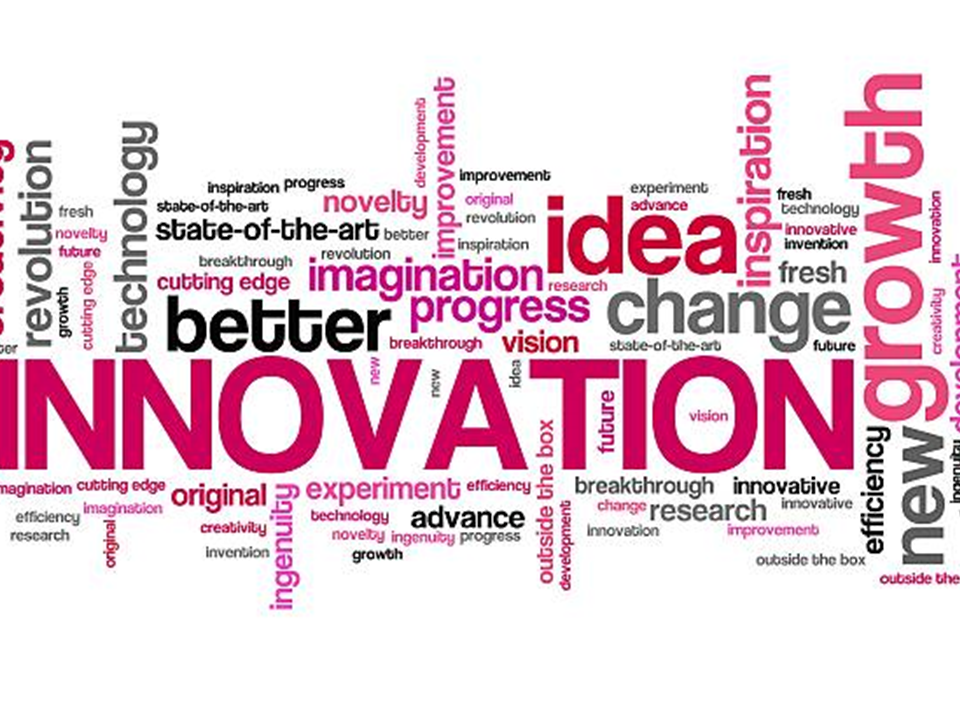 Nowadays the word ‘Innovation’ seems to appear in every organisations Values or Mission Statements! …and we are, probably, claiming that our Business Processes are ‘Innovation in Action’… but is that three words…or two? 🙂
Nowadays the word ‘Innovation’ seems to appear in every organisations Values or Mission Statements! …and we are, probably, claiming that our Business Processes are ‘Innovation in Action’… but is that three words…or two? 🙂
To see the current and true definition of the word ‘Innovation’ – we have to consider the individual elements and understand the 3 Attitudes which constitute true Innovation.
This workshop is facilitated by an ex European Vice President of 3M – who, according to Tom Peter’s Best Selling Book “In Search of Excellence” – “3M is the BEST COMPANY in the World for Innovation.”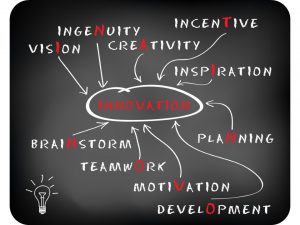 Delegates will learn some fascinating insights into companies who have mastered the art of innovation: 3M, Apple, Nike, several leading Local Authorities and NHS Foundation Trusts and will hear best practice examples of Innovation and Creativity across every Sector.
Delegates will learn some fascinating insights into companies who have mastered the art of innovation: 3M, Apple, Nike, several leading Local Authorities and NHS Foundation Trusts and will hear best practice examples of Innovation and Creativity across every Sector.
Having worked for 3M for 25 years as a Divisional European Vice President and being responsible for the rolling out of LEAN/Six Sigma Business Improvement strategies across their European Operation, he has a fascinating insight into HOW 3M “do” Innovation. In Tom Peter’s Best Selling Book “In Search of Excellence” – Peters’ identified a number of companies who he felt had excelled in specific disciplines. E.g. FedEx for their Logistics, Disney for their consistent “Best in Class” ratings for Customer Service – and he cited 3M as being “the best company in the World for Innovation”. 3M is a $35bn global conglomerate with 50% of its annual sales being made from products which had only been launched in the previous 18 months – a ‘financial testimony’ as to the culture of innovation and the leadership and followership principles which lie at the heart of 3M’s success.
This workshop provides insights into the secrets of creating a Culture where Innovation and Empowerment Thrive.
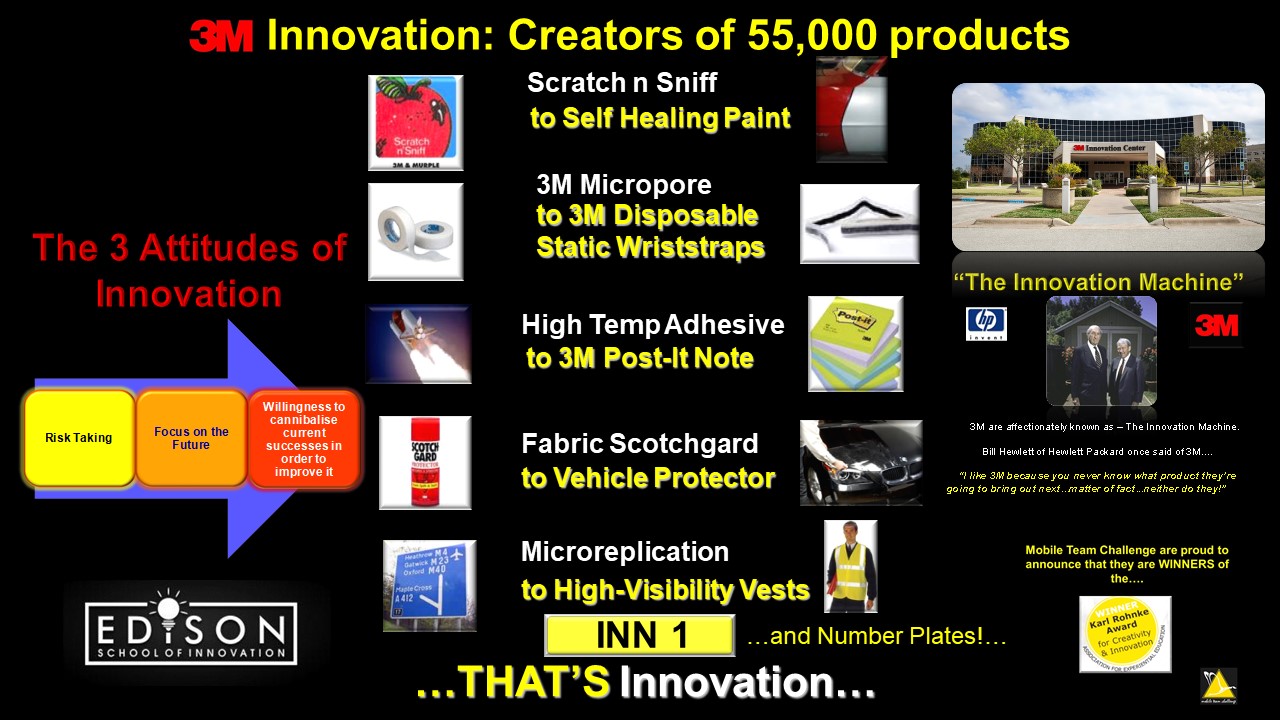
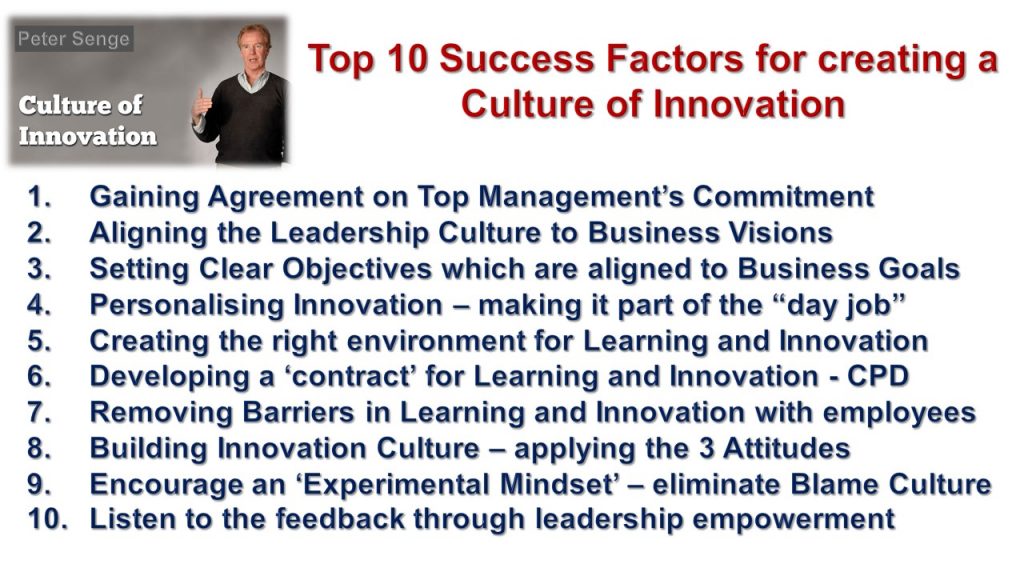
Upon the publication of Tom Peter’s Book – 3M fielded MANY telephone calls from organisations who asked if 3M were prepared to share “Best Practice Principles” as to the secrets of 3M’s outstanding innovative culture – and I hosted Senior Management Teams from many global corporate organisations at 3M – e.g. Hewlett Packard, IBM, Motorola, Nokia, Coca Cola, British Telecom, Siemens, LG Electronics, Motorola, Jaguar, Ford, Land Rover, Honda etc.
Applying the principles of Peter Senge’s Fifth Dimension and his 10 Successes for creating a Culture of Innovation, this workshop includes fun and practical activities to challenge the delegates to “think differently”.
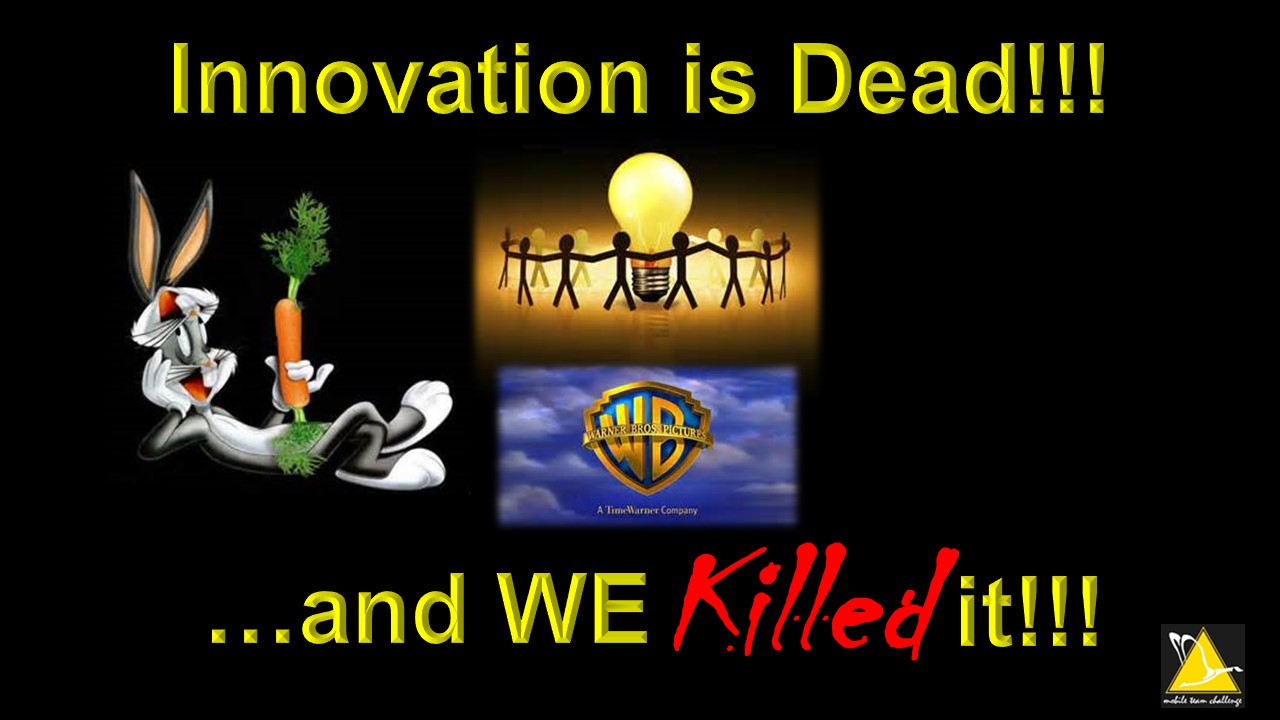
Our Innovation Specialist was also invited to Disney, Florida and Warner Brothers to present Keynote Speeches on Innovation – and the title of his presentation was “Innovation is DEAD…and we Killed it!” …which, although quite a provocative title! – it captured the imagination and caught the interest of hundreds of delegates who attended those sessions. (For the record…. Innovation is NOT dead… 😊 … but we see so many organisations who are guilty of killing off innovation within their employees and companies.)
Now, in his role within Mobile Team Challenge he is invited to help organisations from MANY sectors with their Organisational Development and Strategies and he usually starts by asking them what their Vision and Mission Statement is. From experience over 90% of the organisations have the word “innovation” somewhere in their Statements – however – a large proportion do not have an accurate definition of the meaning of the word “innovation”. Having worked closely with the Edison School of Innovation in Arizona for a number of years – their priority was to arrive at the ultimate definition of “innovation” and the 3 attitudes it embraces. These are the attitudes that we cover in our workshop – along with 3M’s Principles of Innovation and the ‘encouragers and stiflers’.

Delegates will:
- Learn how to create a culture of Innovation within their Teams.
- Learn the impact of Leadership Styles: Are they encouraging or stifling innovation?
- Learn how to overcome the “Blame Culture” which kills innovation.
- Consider the 3 Attitudes required for Innovation to Thrive
- Learn the secrets of Innovation from 3M, Apple, Nike, Local Authorities and Several NHS Foundation Trusts
- Explore the 10 Success Factors for Innovation to Thrive
- Consider the 7 Principles to Encourage Innovation:
– Separate Idea generation from evaluation
– Test Assumptions – Don’t Assume
– Avoid Patterned Thinking – Shifting that Paradigm!
– Creating New Perspectives
– Minimise Negative Thinking and apply Positive Psychology
– Applying the 3 attitudes of Innovation
– Choosing the Correct leadership Style and Culture
- Learn how to Leverage Innovation to achieve Competitive Advantage
- Applying Solution Focussed Thinking Solutions with Appreciative Inquiry
- Explore the impact that LEAN Thinking, Six Sigma and Kaizen Continuous Improvement processes have on Innovation
- Creating Shared Visions embracing creativity and innovation
- Learn how to optimise their Decision Making and Creative Thinking processes with Edward DeBonos 6 Thinking Hats Concepts
- Consider Peter Senge’s Fifth Discipline Insights – How to create a Culture of Innovation and Learning
CLICK HERE to Download an Overview of this inspirational workshop
4 Modules of 90-minute Zoom Sessions at £45.00+VAT per person per module. Includes workbook, relevant slide decks and a CPD Certificate in Innovation.
mtceurope
“When Sales Intelligence meets Emotional Intelligence”
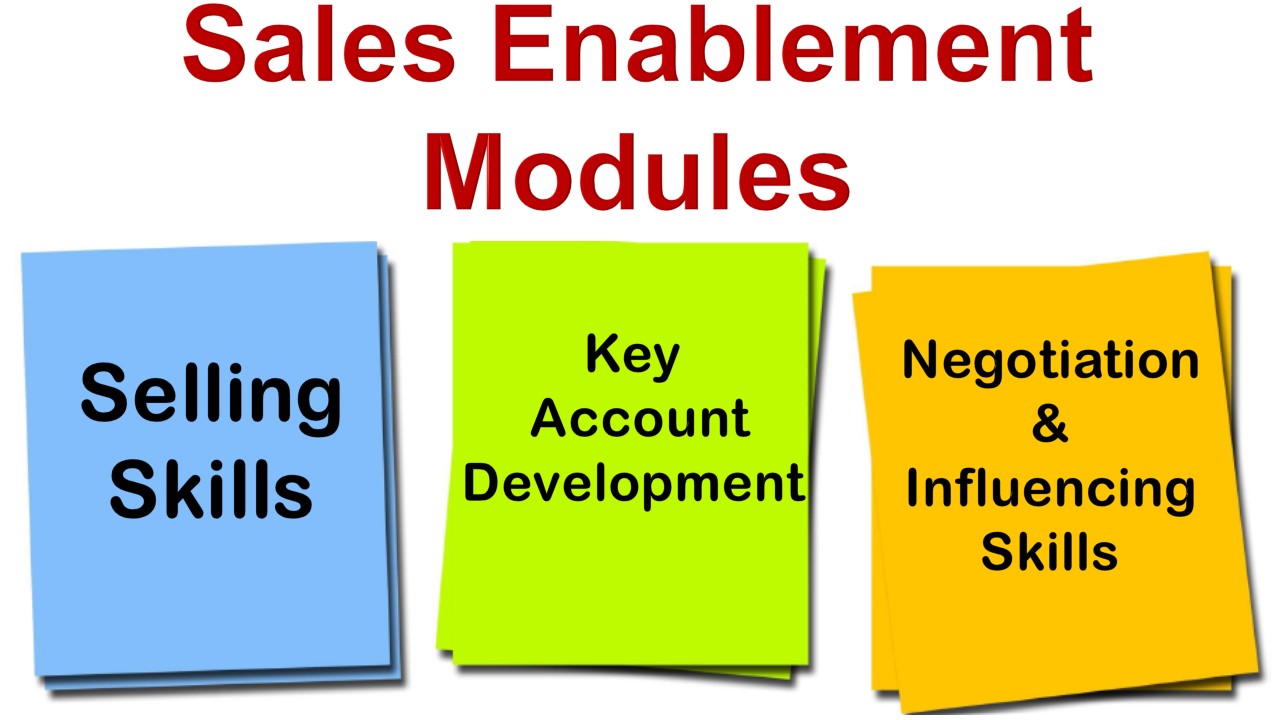
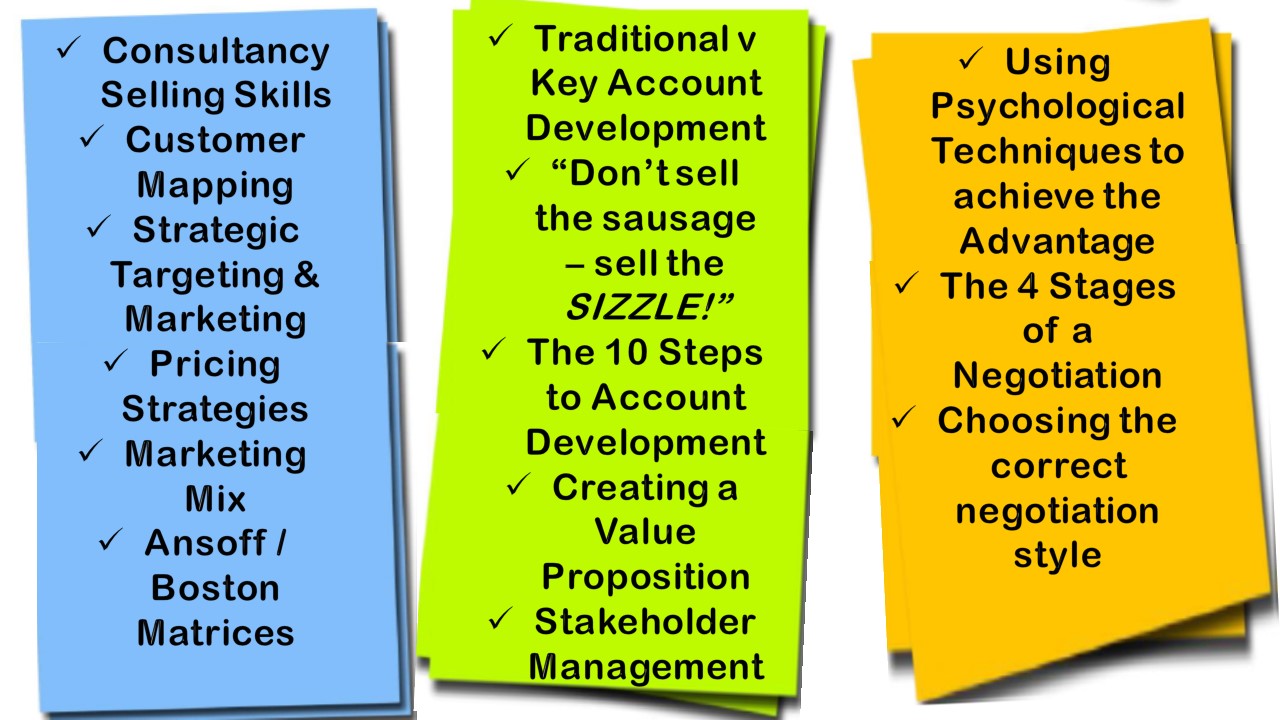
| Forget the “Hard Sell!” Learn the latest in ‘Strategic’ & Consultative Selling techniques Want to build repeat business from existing customers? Learn the 10 Steps of Key Account Development Learn how to develop your Negotiation & Influencing Skills – using Psychological Tips and Tricks to give you the advantage. |
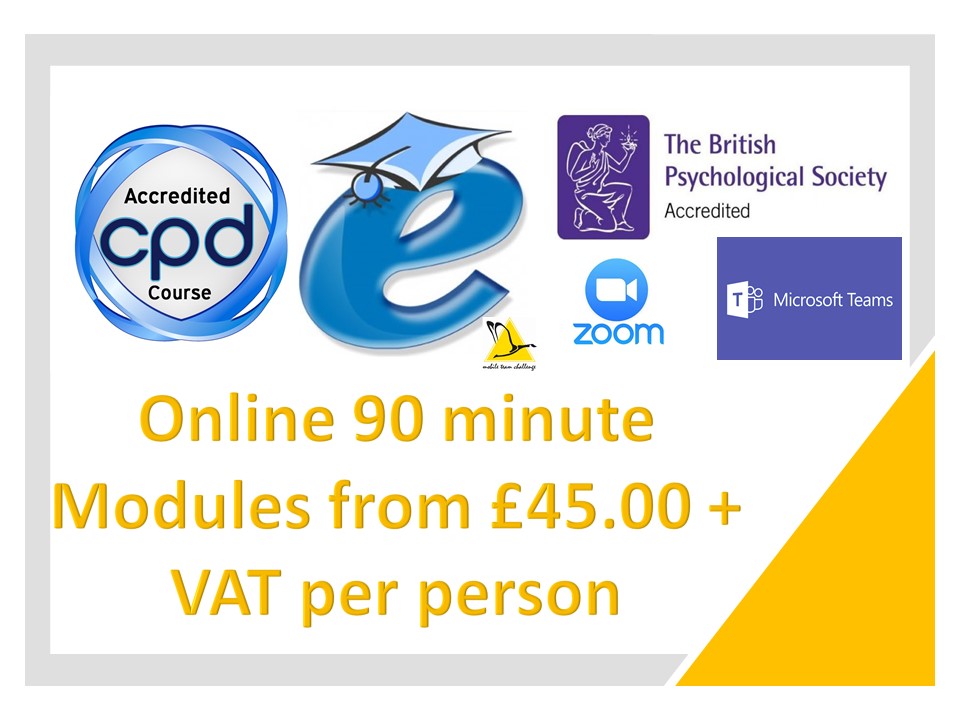
| Take your Business Development Skills to another level: If you were given a choice of which chair to sit in when at the negotiating table…would you know which chair to choose to give you the advantage? Would you be able to predict how the negotiations were going to go based on your initial hand shake with your customer? Do you know which Negotiating Style to Choose for optimum effect? Do you apply psychological tips and tricks to give your negotiations ‘the edge’? If your answer to any of the above is “No”… contact us today to book your Zoom modules. Either Groups or 1-to-1. |
“People will buy from people they like.” Peter Drucker

They say that “sales” is the oldest profession in the world since it was Eve who “sold” the apple to Adam – and ever since, life has revolved around the commercial transaction of exchanging goods or services for money.
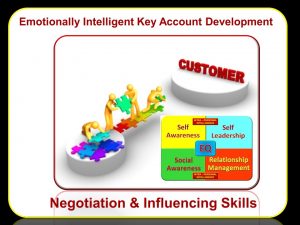
Over the years the sales process has evolved and various styles of selling have come and gone like a fashion. Most peoples’ concept is that to be a salesperson you have to be cunning, devious, extravert, have the “gift of the gab” and maybe… even slightly less than honest . Sadly, there are still companies who actively recruit sales people with the above characteristics, whereas, the most successful and proven way of sales professionalism is a long way from the traditional “Hard Sell” approach.
This one day workshop was designed and created by a Fellow of the Institute of Sales and Marketing and it not only looks at the traditional selling techniques of:
the traditional selling skills techniques of building rapport, closing techniques, consultative selling, handling objections, key account development, ‘making marketing work’ and Customer Service Excellence , it also includes the psychological aspects of developing emotional intelligence to our Relationships and People Skills.
As Peter Drucker once said “people will buy from people they like” and the addition of E.I. skills development enables sales people to; build rapport, strong business relationships and strategic customer relationships (rather than transactional relationships) which lead to stronger customer and brand loyalty with your Clients.
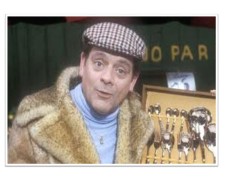
Dispelling the myth of the HARD Sell –
The Consultative Selling Approach to Sales. Applying Emotional Intelligence and psychology to our Key Account Development to increase Customer and Brand Loyalty.
Selling at an executive level doesn’t stop when the contract is signed. To develop the business and prevent attack from the competition, Major Accounts need nurturing. This Workshop illustrates how knowledge of various corporate cultures will give you a customer compatible approach that safeguards and maximises your account revenue.
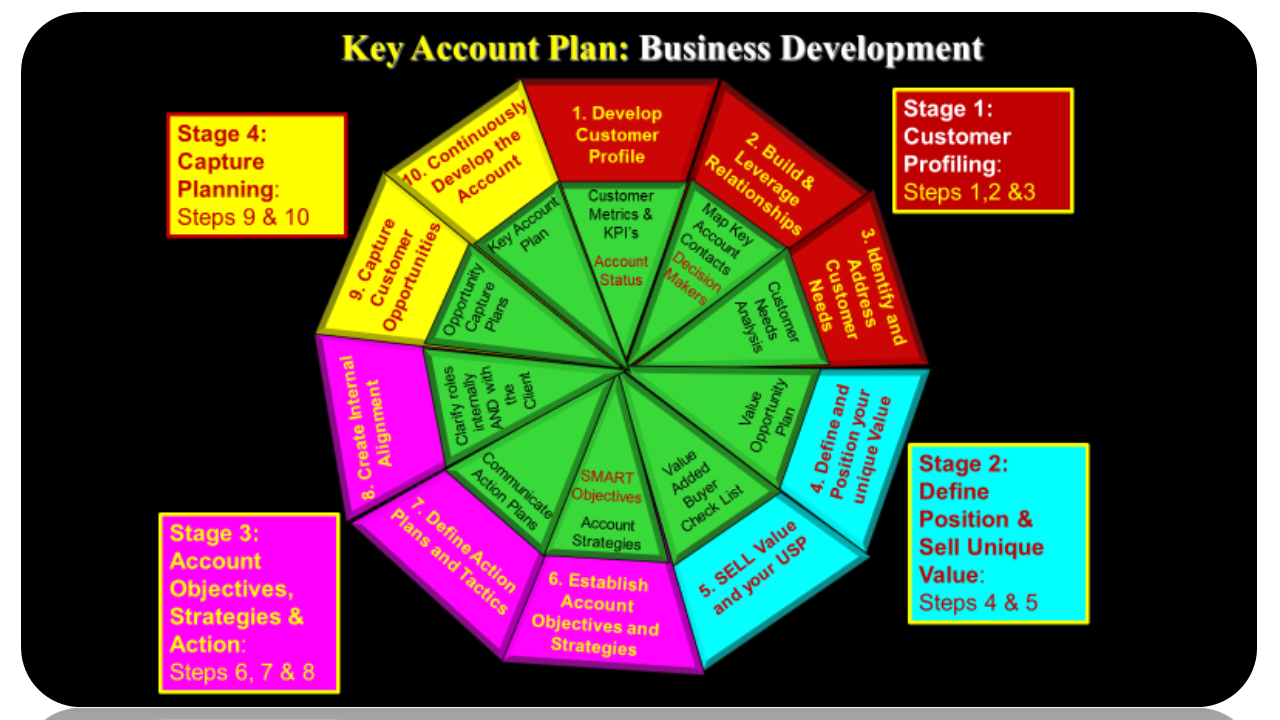
The 10 Steps to Key Account Development
The workshop explores:
- Value Propositions
- Presentation Skills
- Strategic Partnerships
- Key Account Development
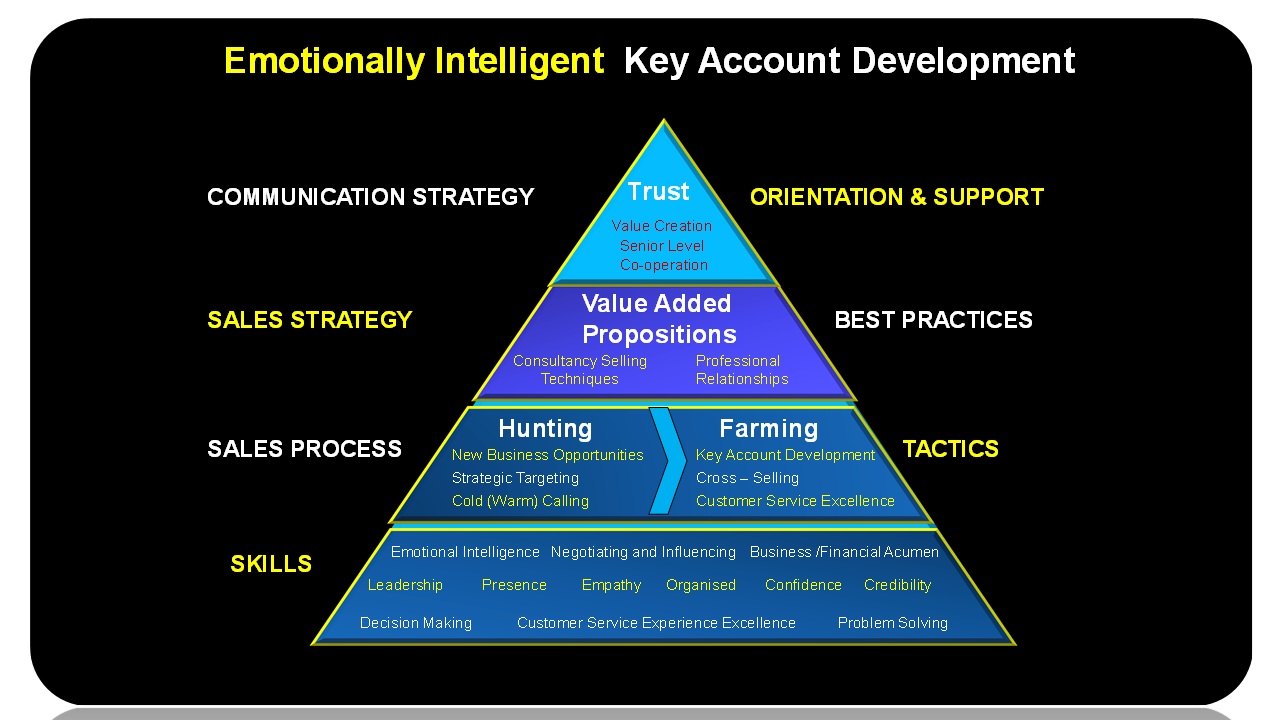
- Key Account Mapping
- Multi-level Selling
- Customer loyalty
- Choosing profitable, growth accounts to develop
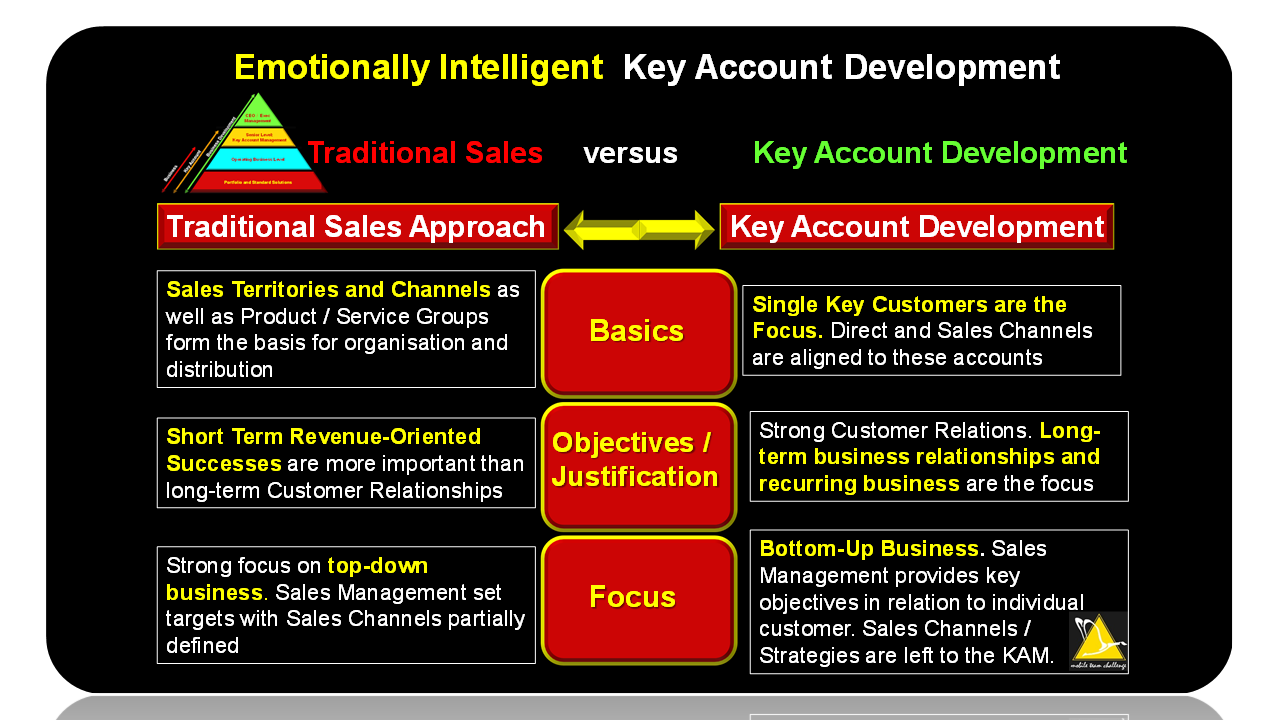
- Understanding Buyers’ Sourcing Strategies
- Developing an account through 4 Stages from : Transactional, Functional, Affiliative to Strategic
- Identifying Cross-Selling opportunities using the Ansoff Matrix
- Choosing the correct Pricing Strategy to match the stage of Account development
- Product Portfolio Analysis Tools
- The role of Executive Selling in Key Accounts
- Emphasising your USP’s and Value Proposition
- “Don’t Sell the Sausage – Sell the Sizzle!” – Feature, Advantage & Benefit
- Applying psychological tricks to establish the ‘higher-ground advantage’
- Understanding the Personality Style of the Buyer
- Seeing your Company through the ‘Eyes of your Customers””’
Click Here for an Overview of this Workshop
Likely Cost: £895 + VAT per Group for 1 Day Course or £1,495 +Vat for a 2 Day course which entails Key Account / Product Mapping + £45 per E.I. Profile if required
mtceurope
The 7 Habits of Highly Effective People, Teams and Leaders
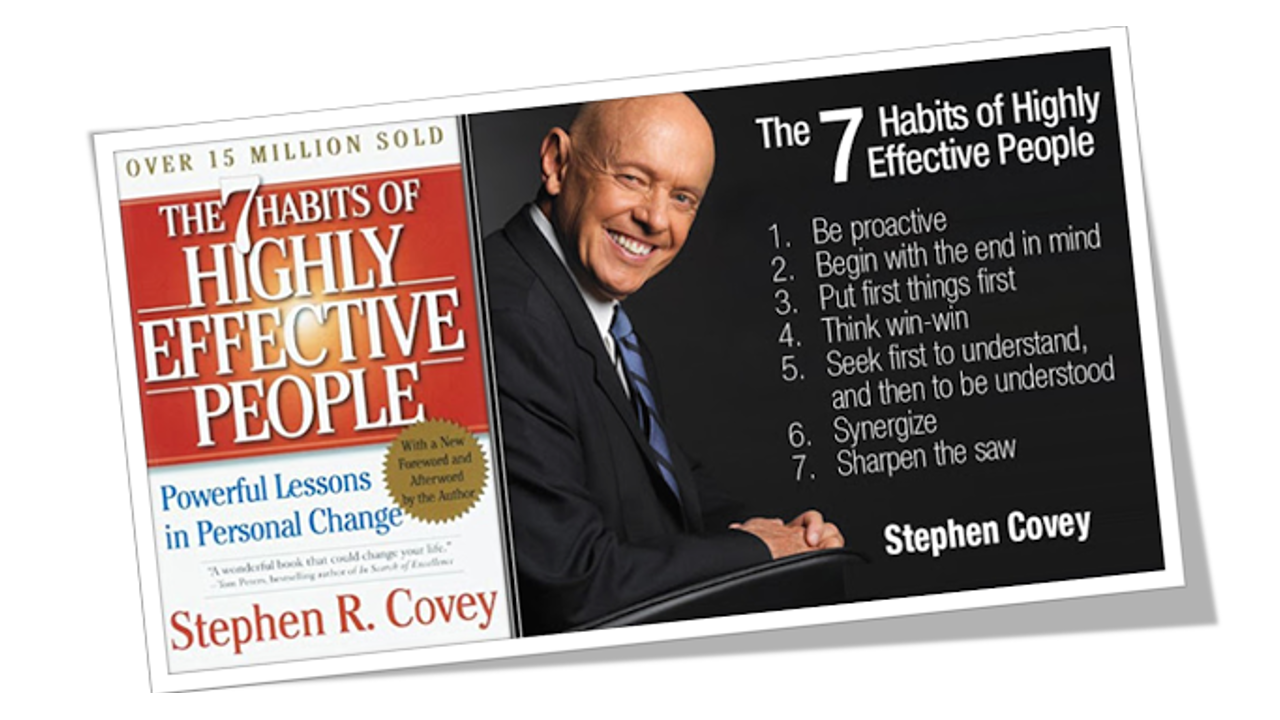
Stephen Covey’s best selling and award-winning book “The 7 Habits of Highly Effective People” is STILL the “Go To” book for all those people who are committed to Continuous Personal Development. This workshop refreshes the 7 Habits and applies them to the roles of Individuals, Teams or Leaders who want to use proven concepts to shift their paradigm of life and work.
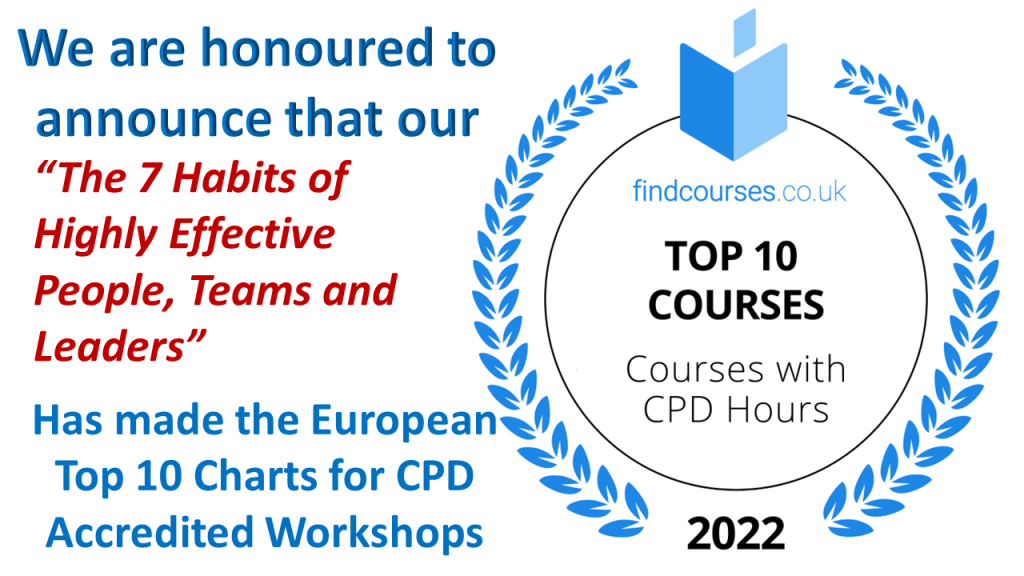
The first three habits surround moving from dependence to independence and self-mastery
Independence
1. Be PRO-Active
Take responsibility for your reaction to your experiences, take the initiative to respond positively and improve the situation. Recognise your Circle of Influence and Circle of Concern. Focus your responses and initiates on the centre of your influence and constantly work to expand it. Don’t sit and wait in a reactive mode, waiting for problems to happen (Circle of Concern) before taking action
2. Begin with the end in mind
Envision what you want to achieve in the future so you can work and plan towards it. Understand how people make decisions in their life. To be effective you need to act based on principles and constantly review your mission statements. Are you – right now – who you want to be? What do I have to say about myself? How do you want to be remembered?
3. Put First things First
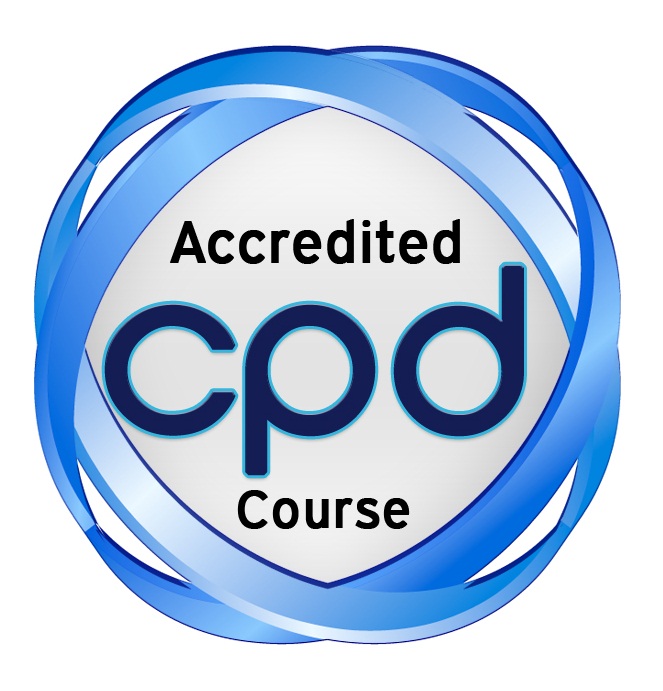
Matrix of importance vs urgency that Stephen Covey and Dwight Eisenhower used in deciding where to invest their efforts. Categorising our tasks into what is important and what is urgent. Learning the art of prioritisation and over-coming all those “time-stealers” which distract us from achieving our Goals.
The next three habits talk about Interdependence and how we work with others
Interdependence
4. Think Win-Win
Genuine feelings for mutually beneficial solutions or agreements in your relationships. Value and respect people by understanding a “win” for all is ultimately a better long-term resolution than if only one person in the situation had gotten their way. Think Win-Win isn’t about being nice, nor is it a quick-fix technique. It is a character-based code for human interaction and collaboration.
5. Seek first to understand, then to be understood
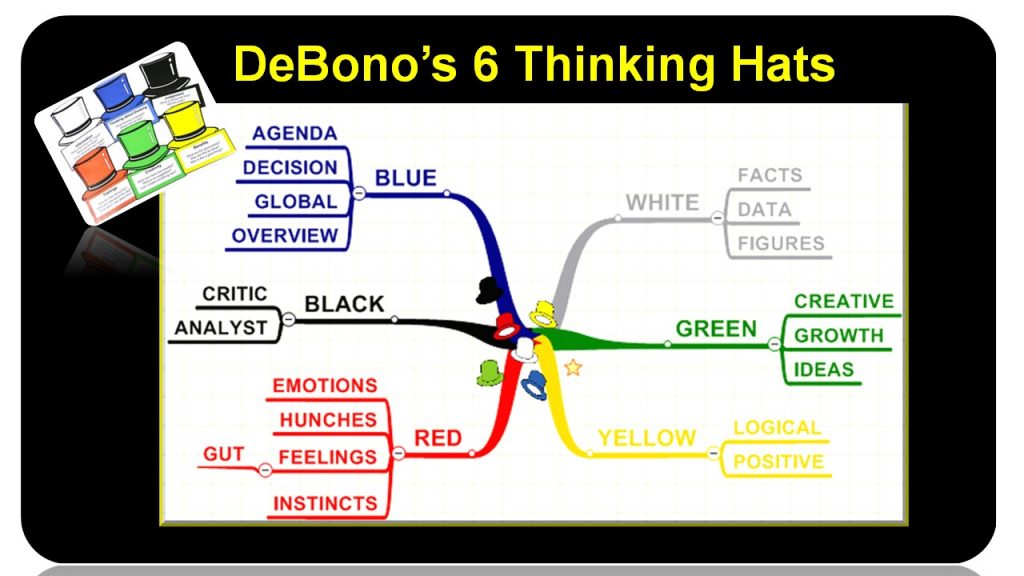
Use empathetic listening skills to genuinely understand a person, which compels them to reciprocate the listening and take an open mind to be influenced by you. This creates an atmosphere of caring, and positive problem-solving. Applying the skills of inter and intra personal skills of Emotional Intelligence.
6. Synergise
Combine the strengths of people through positive teamwork, so as to achieve goals that no one could have done alone.
Continuous Improvement Culture
The final habit is that of continuous improvement in both the personal and interpersonal spheres of influence.
7. Sharpen the Saw
Balance and renew your resources, energy and health to create a sustainable, long-term, effective lifestyle, optimising wellbeing and building stress resilience.
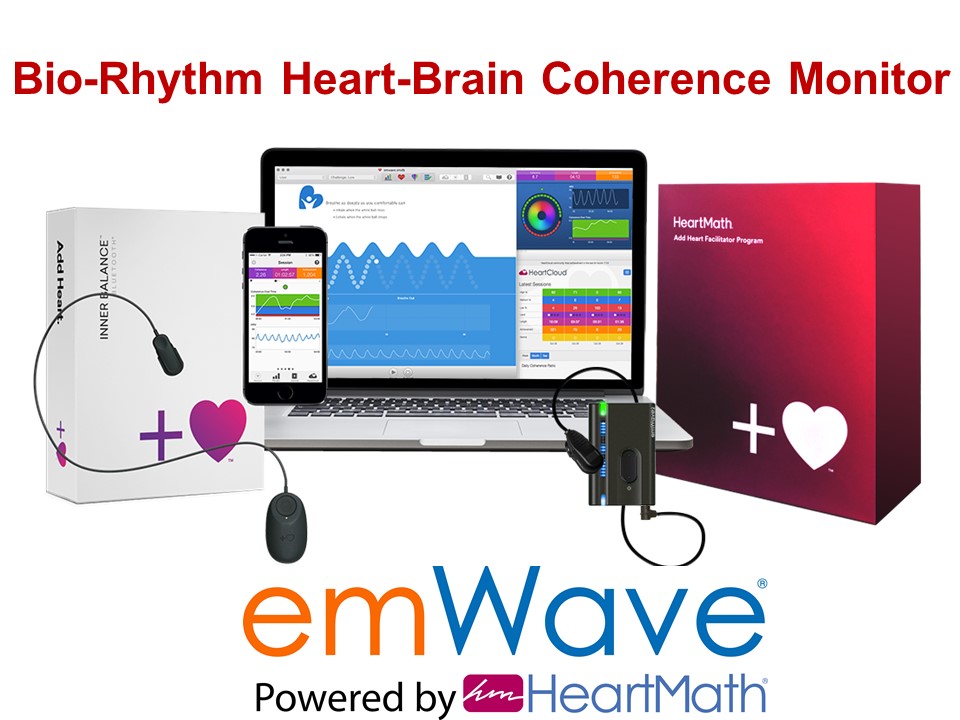
The application of neuro-science enables us to manage our behaviours and attitudes and in turn we can learn how to manage how to optimise our Heart-Brain Coherence.
In essence, one is always attempting to integrate and master the principles outlined in The 7 Habits at progressively higher levels at each iteration. Subsequent development on any habit will render a different experience and you will learn the principles with a deeper understanding.
Delegates will: –
➢ Learn how to manage their own Circle of Influence, in order to become more effective
➢ Consider the impact of learning how to become pro-active
➢ Learn how to adopt Positive Psychology into their lives
➢ Increase their understanding of the importance of “Taking Ownership” in any given situation
➢ Complete a Personal Leadership Style Profiling in order to identify their “natural” style and to identify how to apply the correct style of leadership to any given situation.
(Situational Leadership)
➢ Learn how to use Appreciative Inquiry and the Disney Creative Strategy Visioning Tools to enable collaborative “Buy In”
➢ Create excellent Planning and Prioritising Skills – both Personally (Time Management) and Organisationally
➢ Learn how to define what is “Urgent” and what is “Important”
➢ Learn and develop Professional Communication Skills: NLP, Transactional analysis, Empathic Listening
➢ Learn how to handle Difficult Situations and how to defuse Conflict
➢ Be able to apply The ABC of Managing Behaviours
➢ Explore the causes of Conflict in the Team – and will identify their Thomas & Kilmann Conflict Style – find the Win-Win
➢ The 4 Theories of Motivation …and … how to choose the correct one!
➢ Increase their Self Awareness and Confidence in their Leadership Style
➢ Understand how our 8 Emotional Intelligence Behaviours stack up under pressure
➢ Learn how ‘Listen out’ for the 90% non-verbal communication
➢ Increase their understanding and reading Body Language
➢ Experiment as to how to Apply the ‘psychology of listening’
➢ Become aware of Self + Other Awareness in their Emotional Intelligence
➢ Gain a deep insight into personality types and the dynamic impact that diverse personalities have within a Team.
➢ Complete a British Psychological Society On-line Emotional Intelligent profile to develop “Self” and “Other” Awareness and to identify any Development gaps
for the individual and organisation (Optional Extra)
➢ Develop their personal Emotional Intelligence on their journey towards Emotionally Intelligent Leaders – applying Daniel Goleman’s principles of E.I.
➢ Discover and develop the 8 Emotional Intelligence Behaviours and Attitudes
➢ Learn how to achieve “Buy-In” and how to create “Shared Visions” in their Team
➢ How to Model the Company Vision and Values within your Team
➢ Applying the “Art of Delegation”
➢ Explore; “Leadership, Followership and Conflictors!”
➢ How to create Winning Behaviours and Attitudes in our Teams
➢ Learn the principles and power of Positive Psychology
➢ Discover “The 7 Habits of Highly Effective People – Teams – Leaders”
➢ Consider the importance of personal well-being – ‘beyond’ Mindfulness
➢ How to control your biorhythms and build stress resilience
➢ Learn the importance of developing a flexible leadership style and know when to use each style.
➢ Learn and Consider 3 Leadership models: John Adairs’ Active Leadership, Blanchard’s Situational Leadership and Tuckman’s Leadership Model.
➢ Learn how to create highly effective and functional teams (Lencioni)
➢ Learn the 4 progressive stages of Team dynamics and development
The 7 Habits of Highly Effective People – Teams – Leaders
➢ Discover how to Build High Performance, Emotionally Intelligent, Teams
➢ How to turn Conflict into Collaboration – Managing Conflict in Teams
➢ Explore “The 5 Dys-Functions of a Team” – Creating a Functional Team
➢ Learn how to create buy-in of shared visions thus creating a motivated Team.
➢ Learn how to assess their own teams for functionality (Lencioni’s 5 Dysfunctions of a Team) – and will practice 5 skills to develop functional and high-performance teams.
➢ Learn to use the same Leadership and Team Working Principles which we have previously delivered to the Red Arrows
➢ Participate in Experiential Activities in Team Building
Click Here for and overview of this life-changing programme
This 2-Day, CPD Accredited Workshop is £1,795.00 + VAT- for up to 12 delegates, in-house.
This is inclusive of preparation, materials, workbooks and trainers expenses
Hear what our Customers are saying about this workshop:
“Hi
I just wanted to drop you a line regarding your delivery yesterday in Birmingham.
There are so many things which map directly to our company:
All of the 7 habits:
- Be proactive. Take charge and assume responsibility, live life above the line both personally and professionally
- Begin with an end in mind. Have a vision for what you are trying to achieve/the end goal and align your actions accordingly.
- Put first things first. Prioritise and don’t get distracted by urgent but unimportant tasks/Issue creep
- Think win-win. Build rapport and positive relationships to get the most out of a business relationship
- Seek first to understand, then to be understood. Active listening, take time to really listen to the other person and only then make recommendations or take actions. Listen to hear – and not ONLY thinking about what your next question is going to be
- Synergize. 1 plus 1 equals 3, work as a team to produce better results – think interviews, searches, projects, planning etc. etc.
- Sharpen the saw. Don’t work yourself to death, take time to recharge before setting off again. Clear mind, reflect, evaluate, and go again.
“Most importantly for me EQ helps to establish a mindset and understanding as well as behaviours and attitudes.”
“Brilliant, engaging delivery, looking forward to the next one already!!!”
“This week, I had the opportunity to spend time with my colleagues from the Commercial Excellence team at the Emotionally Intelligent Leadership training course organised by Mobile Team Challenge Ltd (MTC Europe). I want to express my gratitude to Barry Bailey for conducting two days of captivating sessions. The training offered valuable insights into emotional intelligence and provided practical guidance on how we can enhance our effectiveness as leaders and improve our teams.”
“I cannot express enough how much this experience has positively influenced my personal growth and professional development. The course was incredibly enriching, filled with great insights and practical knowledge that I’ve found to be extraordinarily valuable. I believe that the knowledge I have gained will not only contribute to my current role within our team, but can also be applied across the wider business.”
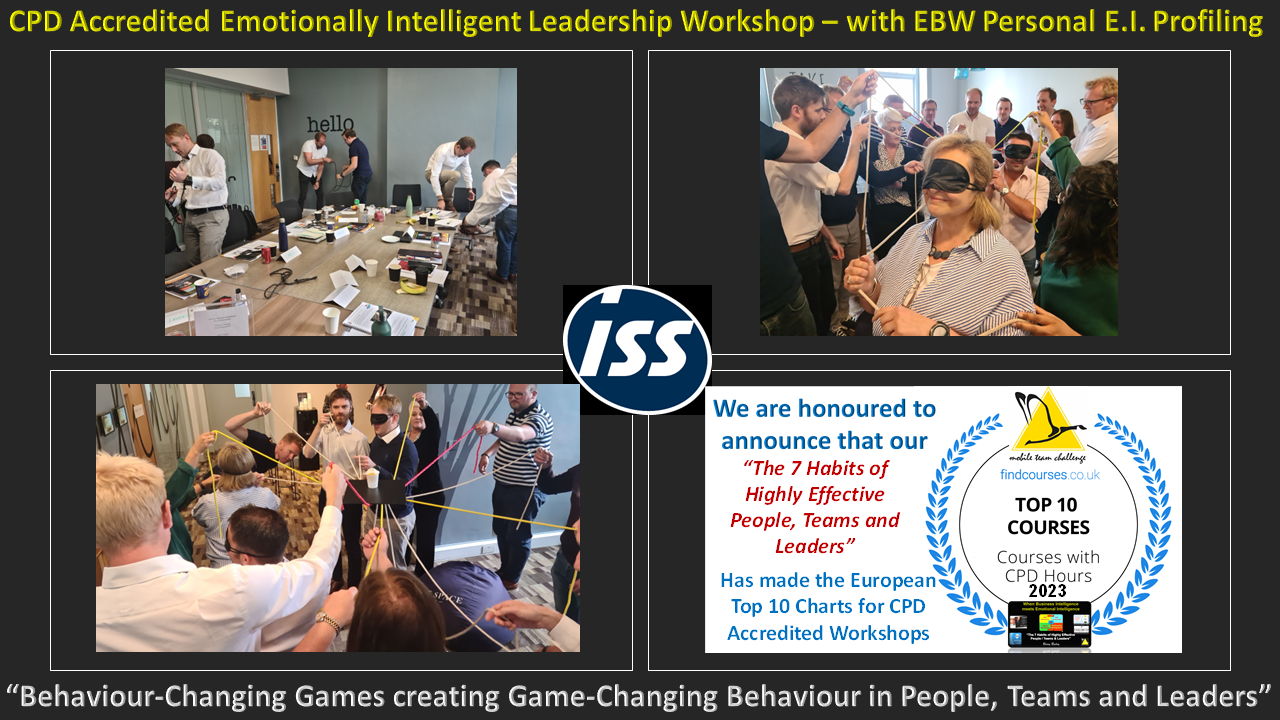
The Emotionally Intelligent Leader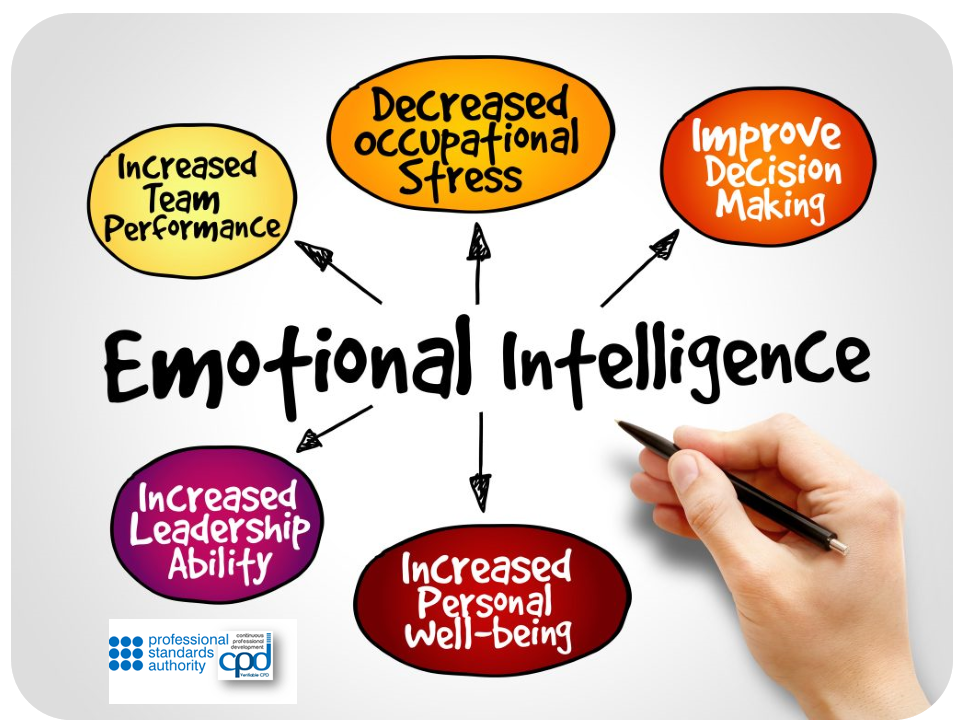
The Harvard Business Review has hailed emotional intelligence as
 “a ground-breaking, paradigm-shattering idea, one of the most influential business ideas of the decade.”
“a ground-breaking, paradigm-shattering idea, one of the most influential business ideas of the decade.”
Emotional intelligence or EI is the ability to recognise, understand and handle your own emotions, and those of the people around you. A development of Self Awareness and Other Awareness makes E.I. the critical personal development tool for those wanting to excel at Leadership and those wanting to create or participate in High Performing Teams. People with a high degree of emotional intelligence know what they are feeling, what their emotions mean, and how these emotions can affect other people. 
Leadership research tells us that the lack of interpersonal skills and the inability to adapt are the two principal derailment factors in leadership careers.
With leaders in organisations spending up to 80% of their time talking and understanding others, changing the nature of how people communicate and work with each other can be the single most powerful way a leader can bring about performance breakthroughs.
Using Business Emotional Intelligence assessments combined with MTC Experiential and Accelerated Learning Techniques in our Leadership Programme enable organisations, of all sizes, to address leadership challenges such as:
- “Our senior management are not demonstrating the calibre we need to lead our future business...”
- “Post-merger the leadership team is struggling to work together…”
- “We need to build the skills of our operational leadership to embrace our changing workplace…”
- “New leaders have to be effective from day one in their role as a senior executive in this business…”
- “Founders of the business need to develop their leadership to match the people and sales growth…”
Emotional Intelligent assessments combined with Daniel Goleman’s leadership model provide a rich picture of the skills, capabilities and financial potential of an organisation’s talent. 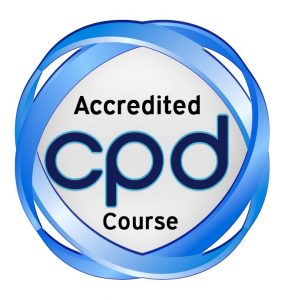
Business Emotional Intelligence assessments for leaders provide:
- Benchmarks against 5000 international leaders
- Feedback on 8 critical emotional drivers and behaviours that predict success
- A map to a leader’s most authentic leadership style (Visionary, Coaching, Democratic Commanding…)
- Insights into blind spots that stop leadership potential
- A blueprint to shift leaders’ ability to deliver results that achieve different outcomes.
- A common language for developing and expanding the whole leadership culture to enhance global performance.
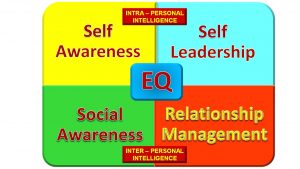
Lead Yourself, Lead your Team and Change your Culture by developing your Inter and Intra Personal Awareness
The Emotionally Intelligent Leadership Programme
Our bespoke programmes, matched to your needs, assesses leadership capability and provides a supportive forum for leaders to quickly learn, reflect and grow.
A typical approach delivered online or face to face would include:
- Leadership Assessment & Coaching – 1 to 1 leadership capability assessment and development.
- Leadership Masterclasses – Discover how the best leaders transform teams & organisations.
- Building Authentic Leadership Sessions – A series of interactive sessions to explore how to use leadership to deliver different outcomes.
- Leading a Team – Practical workshops that explore how leaders empower teams to change how they work together.
Perhaps you are looking to create a high performance, emotionally intelligent, EMPOWERED SUPER Team? …if so…take a look at The 7 Steps to Empowered Teams from the Tanenbaum & Schmidt Leadership Continuum Model… and we’ll show you how you can apply it to your Team.
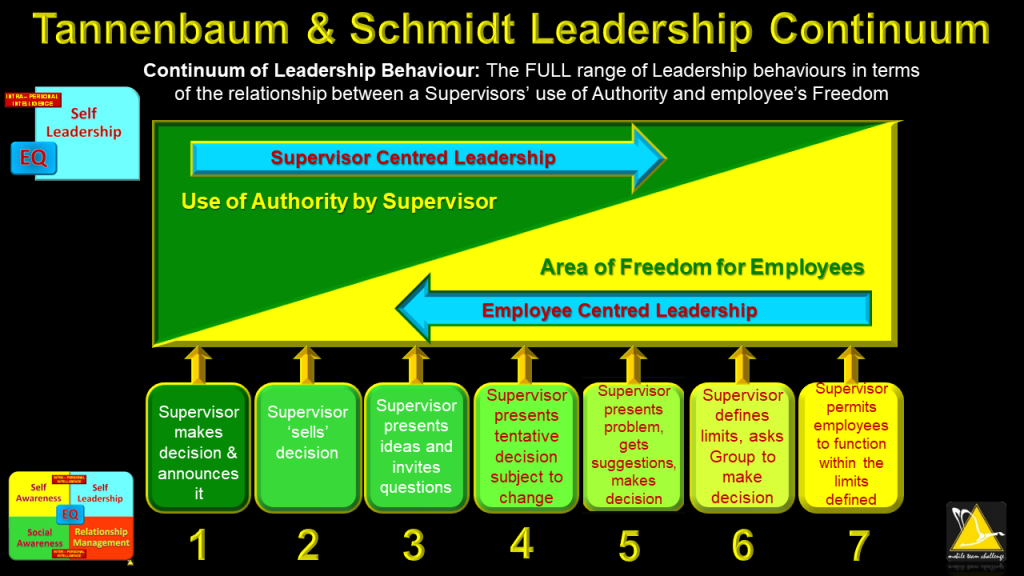
This programme enables organisations to assess their talent and boosts leadership capability by practically exploring the attitudes, mindset and behaviours that make leaders successful, whilst providing them with the tools and skills, to empower, inspire and influence people to maximise their potential and performance.
Distinctive Benefits and Outcomes
The success of this approach is the ability for our Facilitators (Fellow of 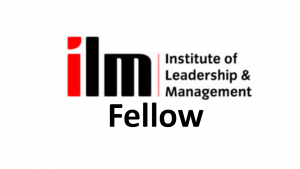 Leadership and Management ) to design a bespoke programme to suit your needs; from Aspiring Leaders and New Supervisors to Middle, Senior and Executive Management and Senior Leadership based around 90-day wave cycles of change that:
Leadership and Management ) to design a bespoke programme to suit your needs; from Aspiring Leaders and New Supervisors to Middle, Senior and Executive Management and Senior Leadership based around 90-day wave cycles of change that:
- Informs and benchmarks an organisation’s leadership talent and where to focus their investment
- Focus on helping participants to ‘learn by doing’, whilst building capability and new emotional behaviours
- Use live examples of issues to experiment with new emotional behaviours and focus on actions generating results
- Implement a series of reinforcing and embedding ‘nudges’ to develop and embed new behaviours (e.g. short cycle coaching, peer trios, relevant videos and reading material for deeper learning).
- Identify your preferred Emotionally Intelligent Leadership Style
What is your dominant, Emotionally Intelligent Leadership Style?
…and how do those around you react to it?
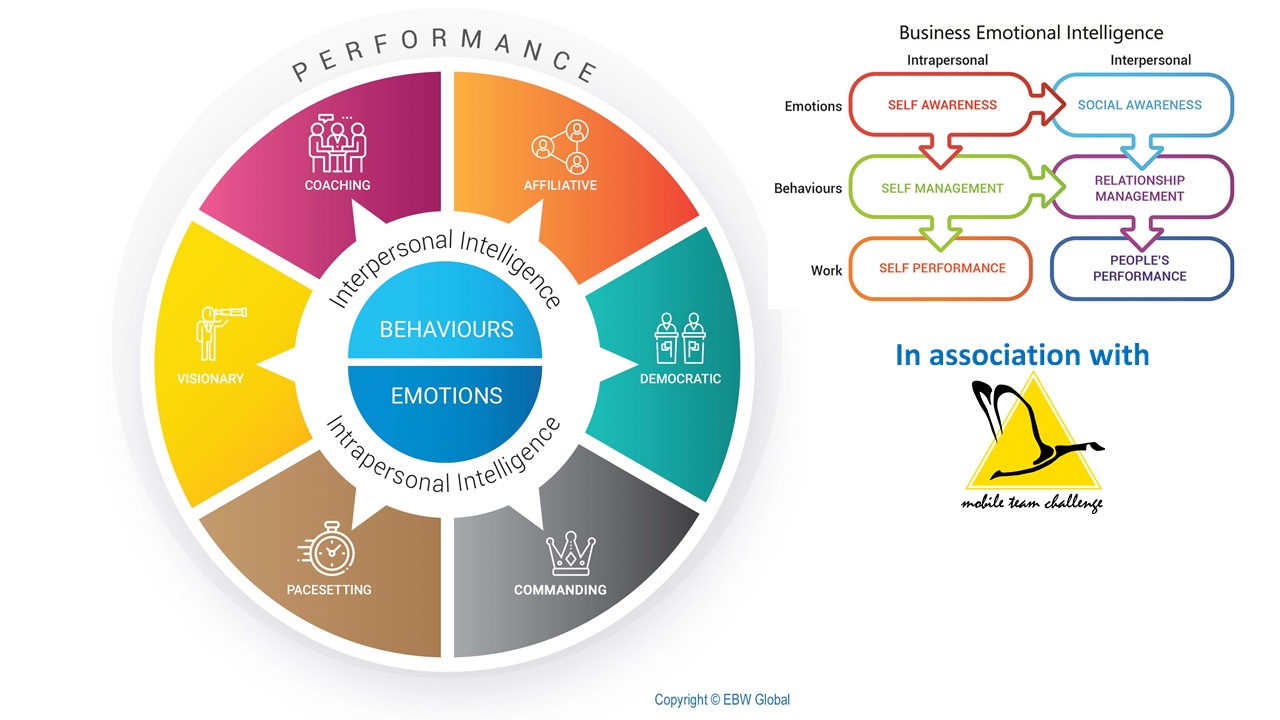
Click Here to read further descriptions of the 6 Emotional Intelligence Leadership Styles.
Click Here to see if the video will help your Self awareness
Is that any clearer for you now?…if not…you can complete a British Psychological Society Emotional Intelligence Profiling Questionnaire and you will receive a 32 page Personalised E.I. Leadership Profile and one of our professional Coaches and Mentors will spend an hour over the telephone or Zoom coaching you on its full meaning for you.
Click Here to book a personalised E.I. Leadership Coaching Session
By focusing on the inter-personal and intra-personal we shift leaders’ capability to deliver different outcomes by providing:
- Better self-insight & personal responsibility for leadership performance.
- Better decision making and risk assessment.
- Enhanced communication & cultural awareness.
- Increased mental toughness.
- More efficient teamwork.
- More effective organisations.
- Better business results!
Click Here to see a sample of an Emotionally Intelligent Leadership Personal Profile
We are now able to offer a choice from 4 different formats of Emotional Intelligence Profiling
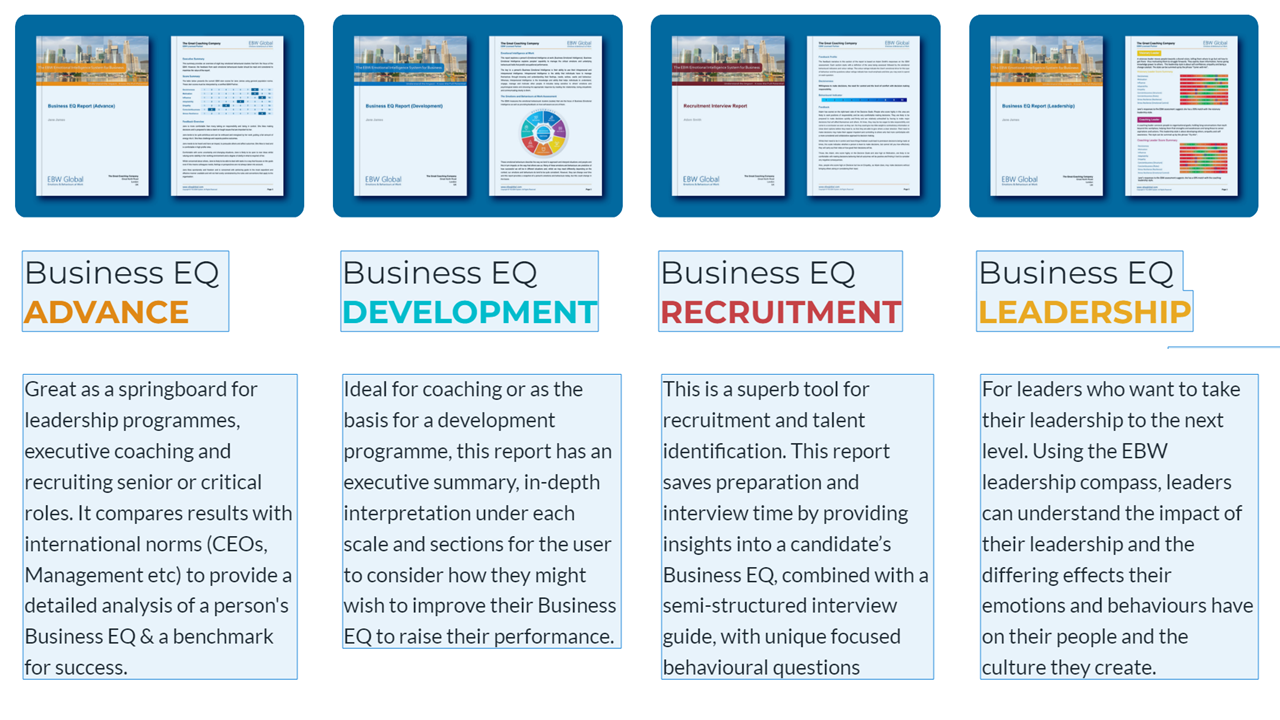

On a scale of 1-10…Do you REALLY know how good you are at Managing Your 8 Emotional Intelligence behaviours below?
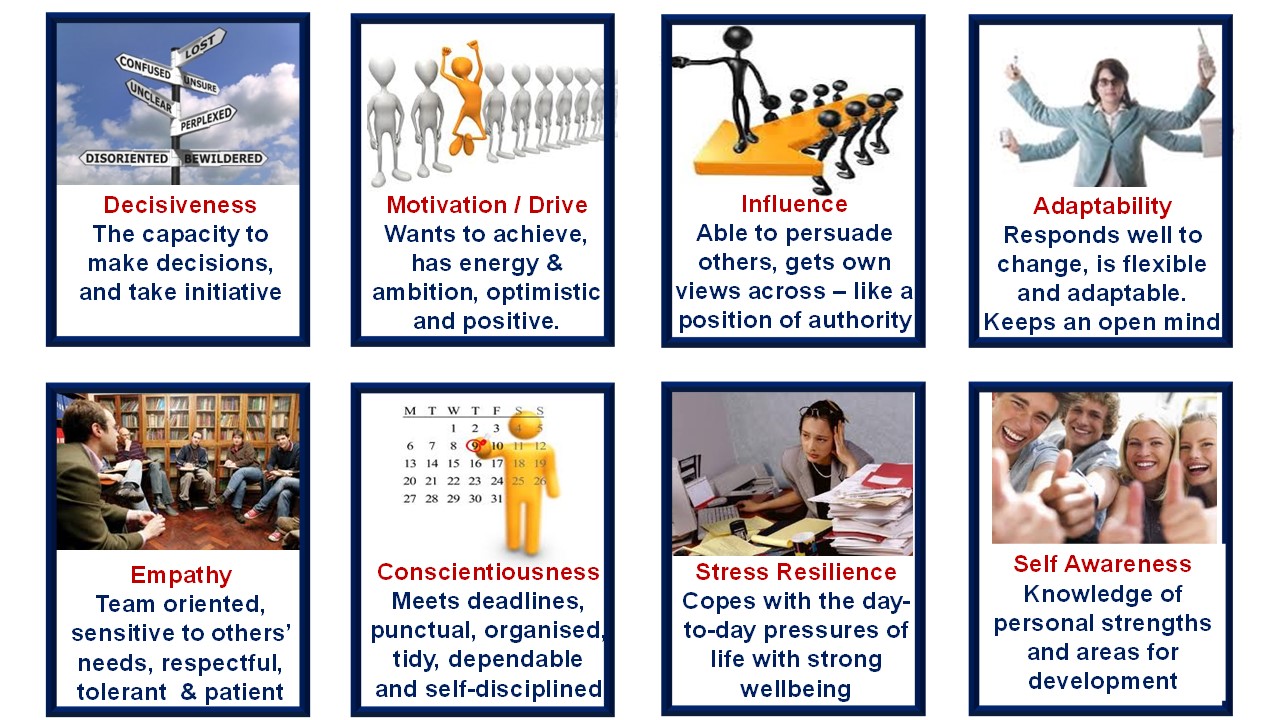
This 2-Day, CPD Accredited Workshop is £1,795.00 + VAT- for up to 12 delegates, in-house Plus £45 per person for a 29-page British Psychological Society accredited personalised Emotional Intelligence profile.
mtceurope
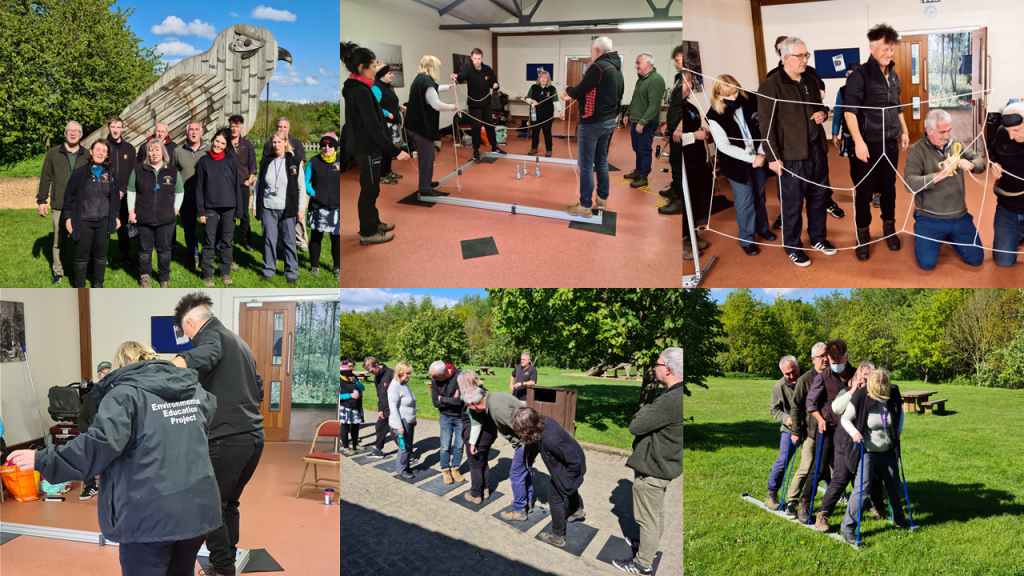
More and more people are talking about Climate Change and the UK’s responsibility towards achieving the carbon emissions target. The UK government will set the world’s most ambitious climate change target into law to reduce emissions by 78% by 2035 compared to 1990 levels, by the end of June 2021.
Prime Minister Boris Johnson said: “We want to continue to raise the bar on tackling climate change, and that’s why we’re setting the most ambitious target to cut emissions in the world.”
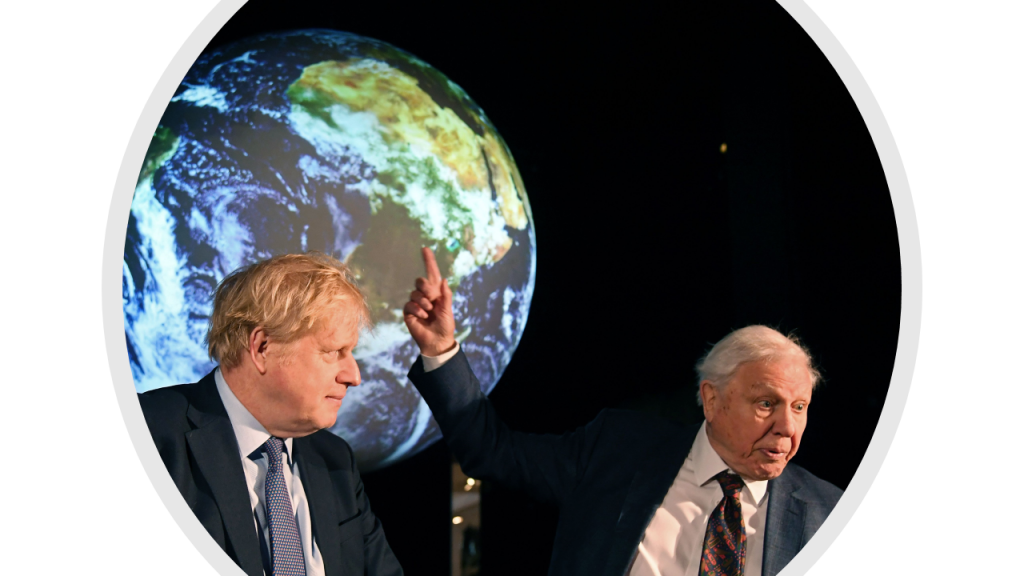
More and more organisations are taking the carbon reductions targets seriously by including their own environmental targets into their company scorecard.
More and more organisations are increasing the awareness of the environment with their employees by running (usually un-inspiring) “Environmental Awareness Sessions”.
And yet, despite ALL of this focus on our environment – how many of us REALLY understand what our personal or corporate responsibility is towards achieving the 2035 target?…and how accountable are we to “doing our bit” for the planet?
Environmental Awareness Training has just become inspiring, motivational, fun, challenging and personal!
Thanks to collaboration between South Derbyshire District Council, the National Forest Company and the country’s leading experiential learning organisation, Mobile Team Challenge you and your team / organisation / university etc can now enrol on the UK’s first “Plan-It Earth Challenge’’ Team Building Days at Rosliston Forestry Centre in the centre of the Country.
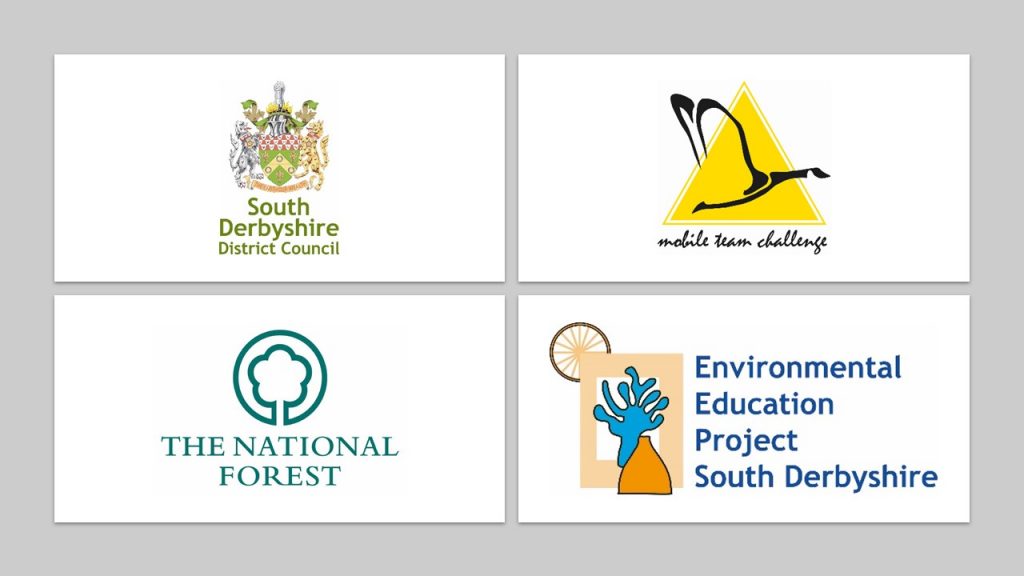
Already, a leading attraction in the area, Rosliston hosts leisure activities, corporate volunteering, conservation days and school visits. It has 154 acres of waymarked walking and cycling routes and 6 luxury lodges hidden within the forest.
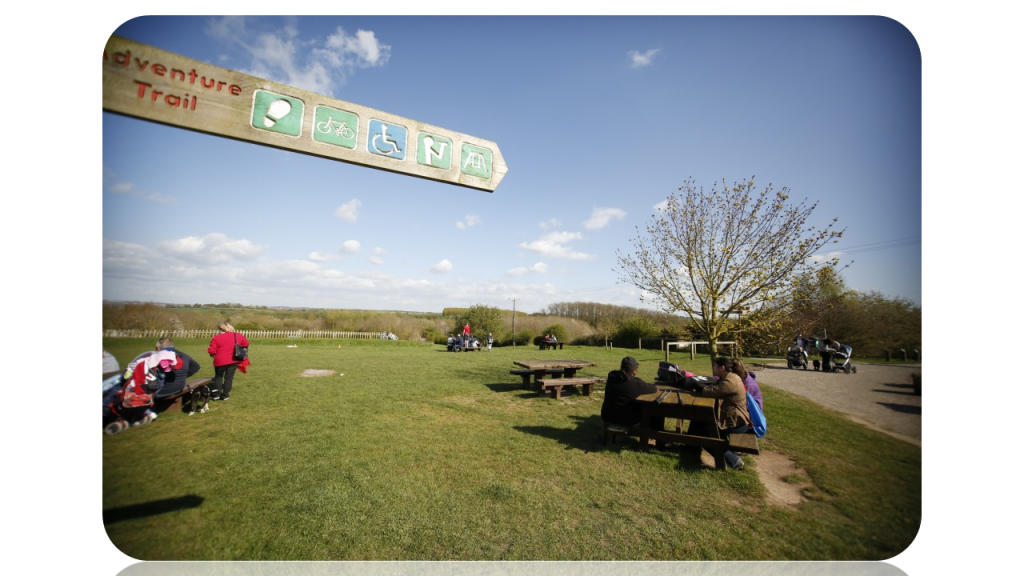
Nestling on the edge of the National Forest and pleasantly located where the Staffordshire Moorlands meet the Derbyshire Dales, Rosliston covers hundreds of acres of unspoilt beauty – which serves as a reminder to all delegates as to how beautiful our planet and our environment is…and how vital it is that we start to protect it…now!
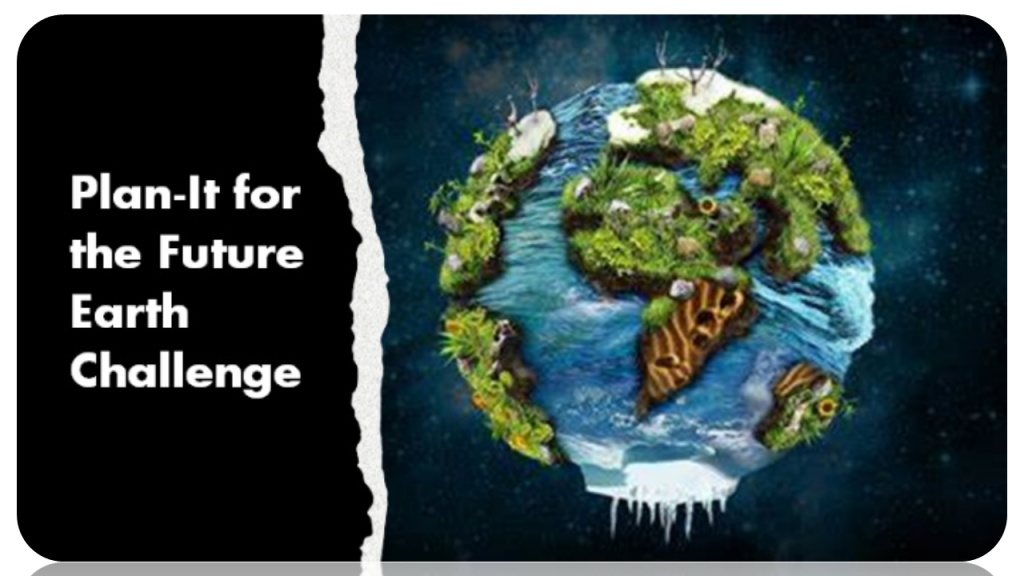
The Plan-It for the Future Earth Challenge comprises a trail through the forest where the delegates encounter eight experiential learning challenges – each activity highlighting a specific environmental awareness topic. Upon completion of the Course, delegates will have earned a CPD Certificate demonstrating the following learning outcomes:
- Increased awareness of carbon reduction targets
- The ‘cause and effect’ of a mis-managed environment
- Increased Awareness of Biological-Diversity
- Increased Understanding of Global Warming and how we can affect it, personally
- A Challenge to: Reduce, Reuse and Recycle
- Increased Awareness of STEMS – Sustainable, Transformative, Environment Management Systems
- Increased Understanding for the need to maintain hedgerows, ‘re-wilding’ our Gardens etc
- A personal accountability and target to help make a difference.
- An open air environment where Business Teams can be challenged to consider and discuss the Organisations’ Carbon Reduction Targets and Personal / Group Environmental meaningful goals.
- Additional Learning outcomes include: Teambuilding, Decision Making, Problem Solving, Communication Skills etc
The Trail can also be used to develop Emotional Intelligence.
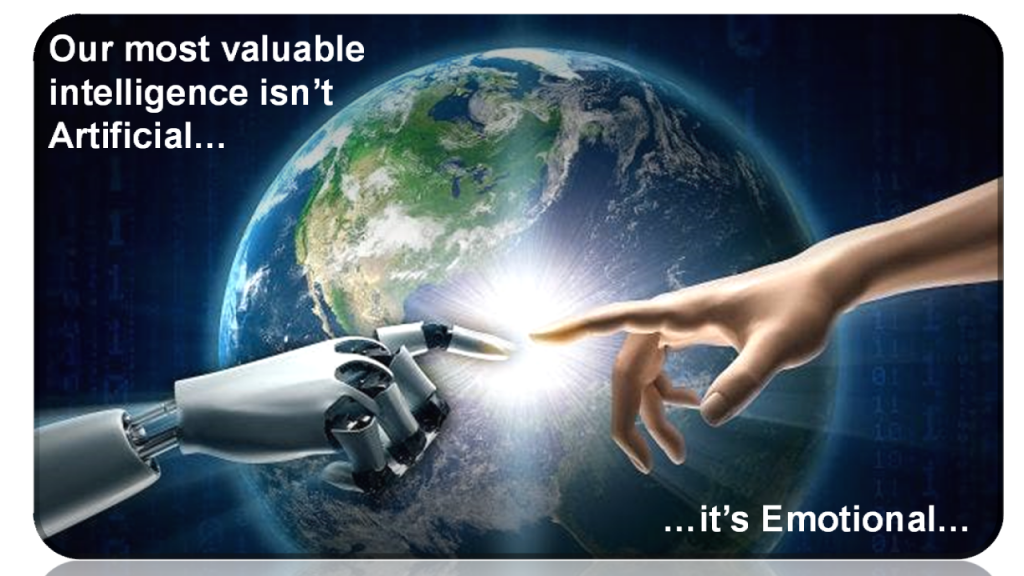
The course can also be used as an Emotional Intelligence Development Challenge utilising the 8 activities which correspond to the 8 E.I. behaviours. Both challenges are CPD Accredited and delegates will receive CPD Certificates in Environmental Intelligence Awareness or Emotional Intelligence. Ideal for Groups, Teams, Corporates, Educational Groups.
Eight experiential challenges ‘hidden’ within the trail – each of which develops one of the 8 emotional intelligence behaviours listed below.
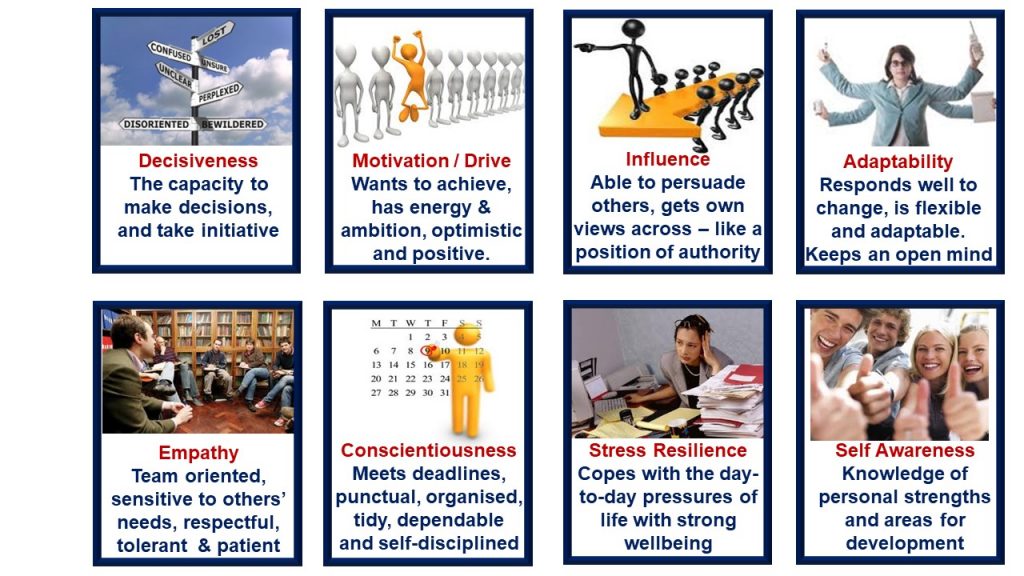
Learning outcomes include:
- Building your team’s impact within your organisation?
- Optimising the efficiency of your Senior Management Team?
- Resolution of deep routed issues between team members?
- A deeper understanding of the emotional behaviours behind capability?
- Getting disruptive teams to work well together?
- Have a clear action plans for high performing teams?
- How to create a Shared Vision and Strategic Plan for your Team based on individual skill sets?
- How to measure exactly HOW Emotionally Intelligent your Team is?
- Developing a better self-insight & personal responsibility for performance.
- Developing decision making and risk assessment.
- Enhancing communication & cultural awareness.
- Increased mental toughness and stress resilience.
- Increasing Empathy and Respect for clients & colleagues
- Building a healthier Personal and Group Wellbeing
- Creating more efficient teamwork.
- Developing more effective organisations.
- Producing Happier Staff and a Happier Workplace!
- Delivering better business results!
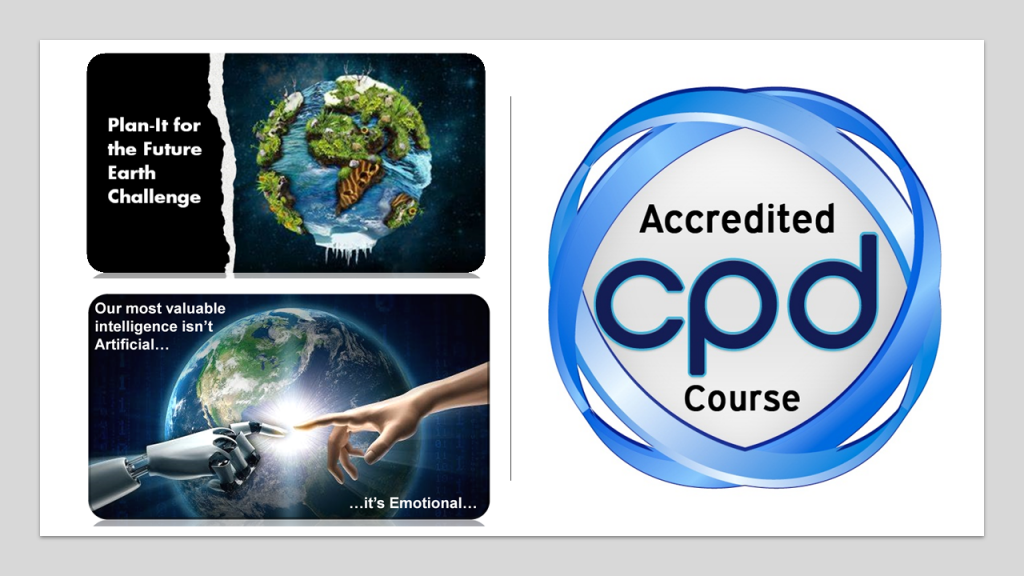
Group Sizes of 15 people per Group – Cost per Group = £895.00 + VAT
These 2 Challenges are ideal for Teams, Departments, Organisations who are wanting to emphasise accountability towards the Government’s Carbon Reduction targets or for those group who want to create Emotionally Intelligent High-Performance Teams and Leaders.
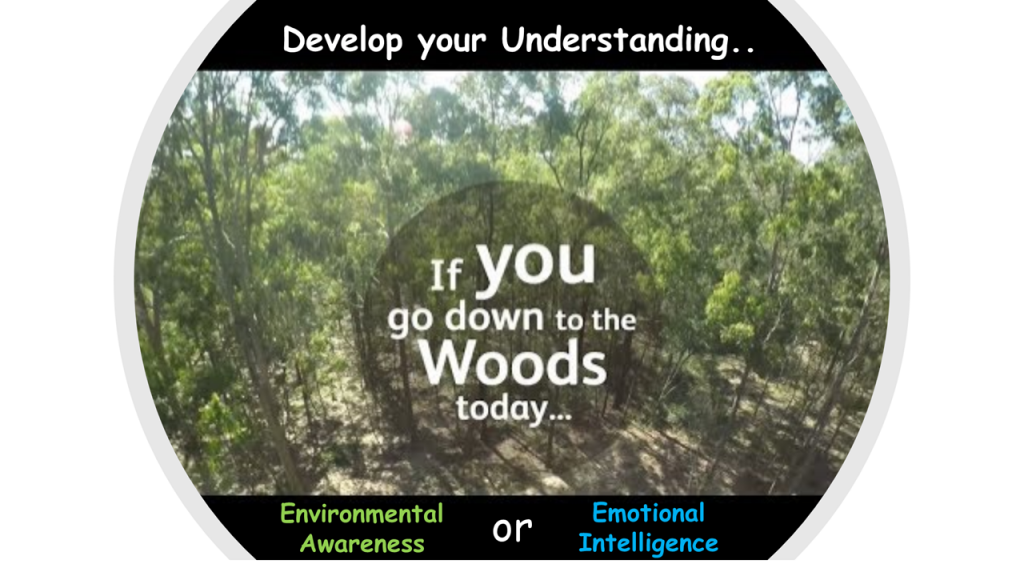
– for further information email us on – Are you up for the challenge?… contact us today.
For further information please click above or call 0844 745 2120
mtceurope
|
|
How to Overcome The 5 Dysfunctions of a Team – Patrick Lencioni
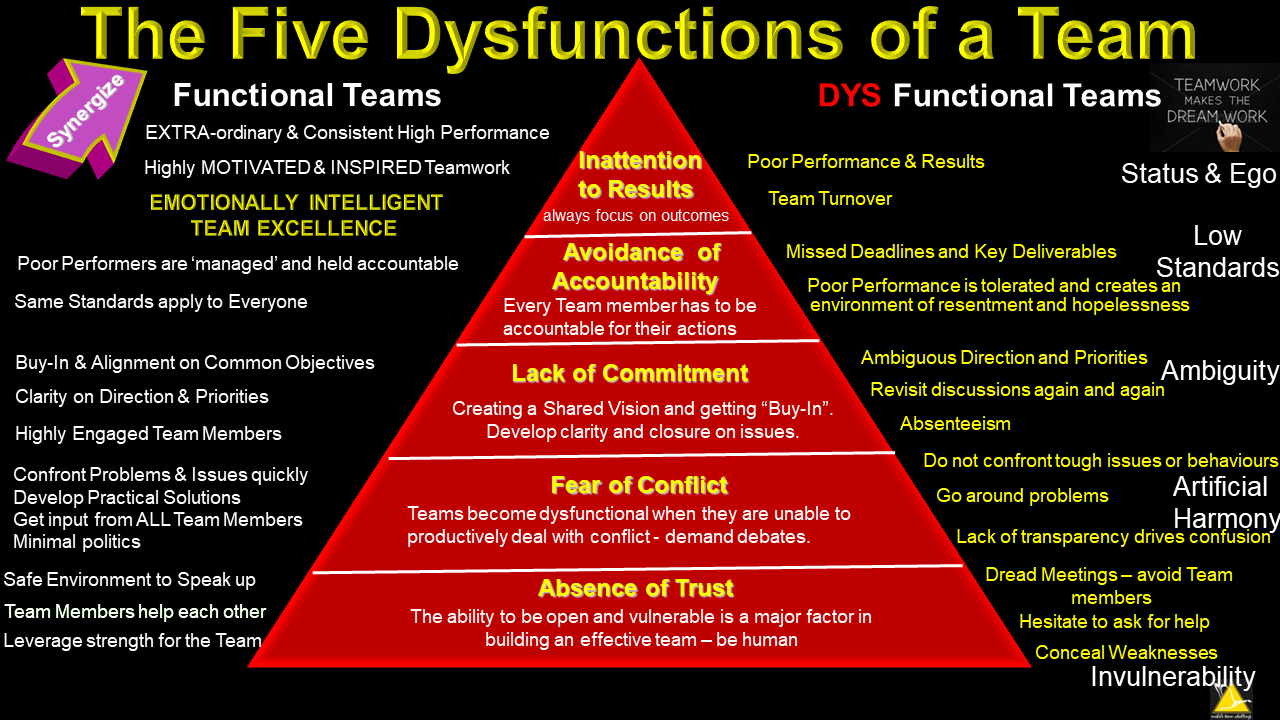
Whether the team you are looking to develop is;
- a Senior Management Team
- or if you are looking to optimise the performance of an internal team or department
- or if you are looking to resolve deep-routed issues between team members
- or if you are wanting to understand emotional intelligence behaviours of team members
- or if you are wanting the team to get a better understanding of each other’s personality types
- or if you are looking for a fun process to create a Shared Vision for the Team
- or if you are looking to create the 5 attitudes and functions required to create highly effective teams….
Then Mobile Team Challenge has exactly the right intervention for you.
Our workshops can either be face to face including experiential learning activities or delivered online via Zoom or Teams.
Click Here to see a sample of an Ultimate Away Day
“Coming together is a beginning, staying together is progress, and working together is success.” Henry Ford
NOW with Myers Briggs or Emotional Intelligence Profiles at £45.00 + VAT per delegate
Cost: per Group of 15 – £1,495 for a 2 day Workshop
A variety of bespoke Workshops that demonstrate the way to unleash collective potential power in Teams in order to maximise their effectiveness and to give them a competitive edge. The sessions explore Team dynamics, Team psychology, Shared Visions/Goals and Belbin models whilst also building trust, confidence, motivation and morale and utilises innovative Coaching techniques in the pursuit of Team Excellence and effective Teamwork.
This course combines adventure experiential learning and self awareness techniques – either at our Adventure Centre or on-site. The course refers to Patrick Lencioni’s “The 5 Dysfunctions of a Team” and also Dr Stephen Covey’s “The 7 Habits of Highly Effective People”.
SO…. you think you know your Team? …click here to see…..
Understanding your Team Members
The owner of our company was European Vice President of the Electronics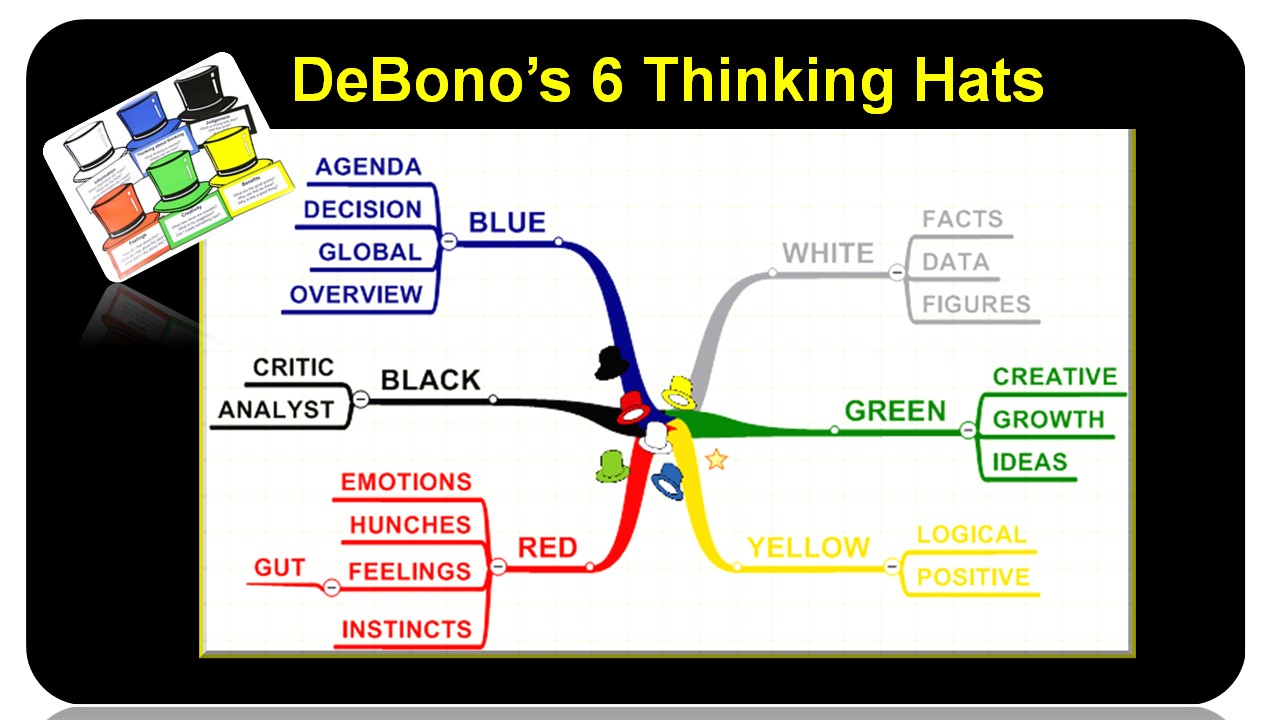 Division of 3M for 25 years and it was during this time that 3M were opening a new showroom to showcase their 42,000 products and Edward DeBono graciously agreed to come and open their showroom. hence, our insight into DeBono’s concepts and revelations were as a result of our CEO of working directly with him. Whilst DeBono’s 6 Thinking Hats were created to increase the efficiency of our various thinking styles and to help develop our “other-awareness” as we see the problem from 6 different perspectives, it actually evolved into being a tool to help us understand different “types” of personality. It serves as an excellent introduction to self and other awareness as a way of understanding our customers, colleagues and team members.
Division of 3M for 25 years and it was during this time that 3M were opening a new showroom to showcase their 42,000 products and Edward DeBono graciously agreed to come and open their showroom. hence, our insight into DeBono’s concepts and revelations were as a result of our CEO of working directly with him. Whilst DeBono’s 6 Thinking Hats were created to increase the efficiency of our various thinking styles and to help develop our “other-awareness” as we see the problem from 6 different perspectives, it actually evolved into being a tool to help us understand different “types” of personality. It serves as an excellent introduction to self and other awareness as a way of understanding our customers, colleagues and team members.
Overcoming The 5 Dysfunctions of a Team: Patrick Lencioni
Patrick Lencioni has been described by the One-Minute Manager’s Ken Blanchard as “fast defining the next generation of business thinkers.”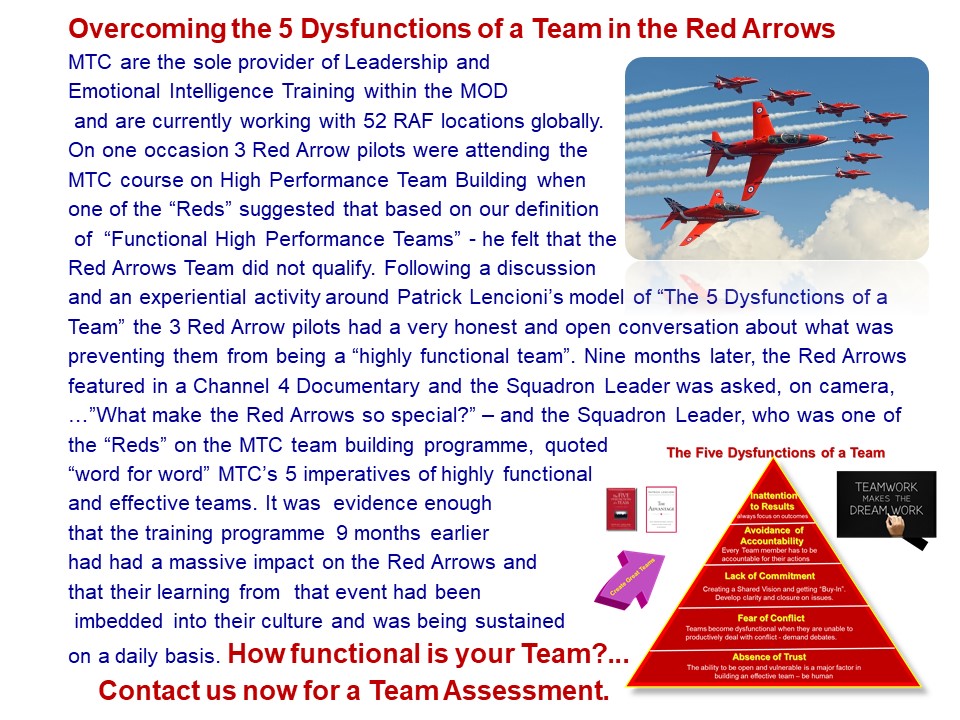
His passion for organisations and teams is reflected in his writing, speaking and consulting. He is the author of five business books, including The Five Dysfunctions of a Team, which continues to be highlighted on The New York Times, Business Week, Wall Street Journal and USA Today best-seller lists.
Pat’s work has also been featured in numerous publications such as Fast Company, INC. Magazine, USA Today, Entrepreneur, Drucker Foundation’s Leader to Leader and The Harvard Business Review and this module will encourage delegates to carefully consider Lencioni’s 5 dysfunctions of Teams.
MTC have been the preferred supplier to the MOD for Leadership, Team Working, Emotional Intelligence and Conflict Resolution Development since 2004 and have trained over 5,000 Military personnel across 60 RAF, Army, Navy and Tri-Services locations across the world. Even the Red Arrows have participated in the MTC Team Working workshops utilising The 5 Dysfunctions of a Team concepts.
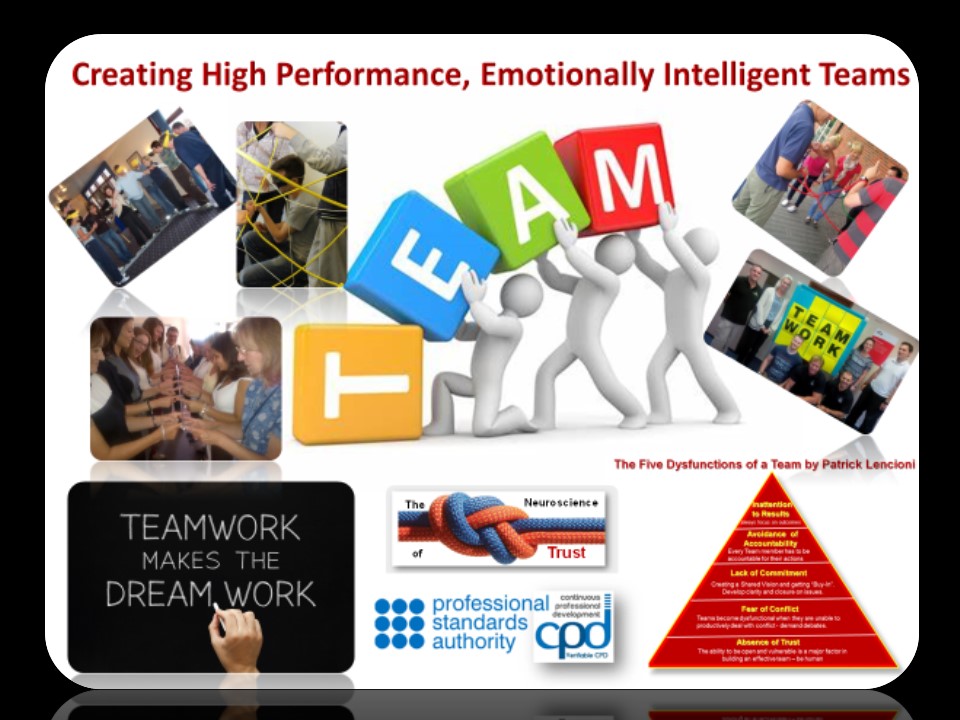
In brief summary, the 5 principles are as follows:
1. Absence of Trust
The first dysfunction is the absence of trust amongst team members. The type of trust the author is talking about here is the ability of group members to show their weaknesses, to be vulnerable and open with one another. Trust is never generated in teams when the team members are not prepared to be vulnerable. Instead they feel the need to be right, to be strong and competent, so much that they are unable to be vulnerable and open with one another. Trust requires that team members have confidence in each other intentions, that they are good and therefore have no reason to be protective and careful in the team. The when I ‘m vulnerable it will not be exploited and used against me by the team. The lack of trust amongst teams is a huge waste of time and energy as team members invest their time and energy in defensive behaviours, reluctant to ask for help and to assist others.
“…teamwork begins by building trust. And the only way to do that is to overcome our need for invulnerability.”
The primary role of the leader is to lead my example, be the first one to be vulnerable, and create an environment where it’s safe to be vulnerable. Building trust makes conflict possible!
2. Fear of Conflict
Trust is the foundation of great teams and its trust that makes team conflict possible. Teams become dysfunctional when they are unable to productively deal with conflict. All meaningful relationships require productive conflict for them to grow. Healthy conflict occurs when people talk about the issue at hand avoiding personal attacks, looking for the best solution for the team. Teams tend to avoid conflict often replacing it with an artificial harmony.
“Harmony itself is good, I suppose, if it comes as a result of working through issues constantly and cycling through conflict. But if it comes only as a result of people holding back their opinions and honest concerns, then it’s a bad thing.”
What Leaders and their teams must do is learn to identify artificial harmony when they see it, and incite productive conflict and resolution in its place. As Bruce Tuckman identified, every Team goes through a “STORMING” stage in its dynamic evolution and this frequently manifests itself as “conflict”.
3. Lack of Commitment
When teams engage in productive conflict they can confidently commit and buy-in to decisions. Commitment is a function of clarity and buy-in. Productive teams make clear decisions and are confident that they have the support from every team member. A lack of commitment usually arises from not hearing all the teams concerns before making a decision. There can be no commitment without debate. People will not buy into something when their opinions and thoughts on the matter were not included and discussed. “If they don’t weigh in, then they won’t buy in.” This is not as much about seeking consensus as it is about making sure that everyone is heard.
“The point here is that most reasonable people don’t have to get their way in a discussion. They just need to be heard, and to know that their input was considered and responded to.”
Leaders can help to facilitate commitment by reviewing all key decisions made at the end of team meetings, making responsibility and deadlines clear.
4. Avoidance of Accountability
Without team commitment you cannot have accountability. If the team is to be accountable, everyone must have a clear understanding of what is expected of them.
“People aren’t going to hold each other accountable if they haven’t clearly bought in to the same plan.”
It’s often the case, that when teams are not holding one another accountable it’s usually because they’re not measuring their progress. It’s important to make clear what the team’s standards are, what needs to get done, by whom and by when. Ambiguity is the enemy of accountability.
5. Inattention to Results
When teams are not held accountable the team members tend to look out for their own interests, rather than the interests of the team. A healthy team places team results as the most important goal. When all team members place the team’s results first the team becomes results orientated.
Leaders need to make the teams results clear for all to see, rewarding the behaviours that contribute to the team’s results. It’s the responsibility of the leader to keep the teams focus on results.
Click Here to watch a short video of The Five Dysfunctions of a Team
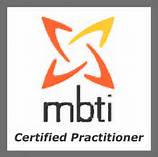
Click Here to see how Myers Briggs Type Indicator Profiles link with how to AVOID Patrick Lencioni’s The 5 Dysfunctions of a Team
Cohesive Teams
By addressing these dysfunctions, what results, is a cohesive team….
“…and imagine how members of truly cohesive teams behave:
- They trust one another.
- They engage in unfiltered conflict around ideas.
- They commit to decisions and plans of action.
- They hold one another accountable for delivering against those plans
- They focus on the achievement of collective results.
£1,450.00 + VAT for a 2 Day Programme – includes Myers Briggs or Emotional Intelligence Profiling FREE OF CHARGE including a “5 Dsyfunctions of a Team Assessment” of YOUR Team… and LOTS of in-house Team Building Activities!
What better time is there than the present to develop your team into a High Performance Team in order to take on the challenges of the current climate? 
This workshop has been specifically designed:
- To create Team Bonding and Team Working
- To create Team Excellence and Team Spirit
- To inspire and motivate individuals to “Play as a Team”
- To understand the roles that people play in Teams (Belbin) – delegates will participate in a Belbin Profiling to see their preferred role in a Team environment.
- To strengthen relationships within the Team
- To Maximise the Planning Efficiency of the Team
- To learn how to Prioritise Tasks professionally
- To build trust within the Team Members
- To practise the concepts of Transactional Analysis
- To explore “Leadership, Followership….and Conflict!”
- To learn how to create Collaboration out of Conflict within Teams
- To identify “The 7 habits of highly effective teams” (Covey)
- To enhance honesty and respect for each other team members.
- To appreciate and embrace diversity within Teams – covering Conflict Management and Resolution within Teams
- To build professional rapport within the Team
- To explore Effective Communication within the Team (NLP)
- To develop wellbeing and stress resilience through Positive Psychology
- To live Above the Line – with Winning Behaviours and Attitudes
- To create a Team Vision and Objectives (Appreciative Inquiry)
- To SOAR! – identify individual and team Strengths, Opportunities, Aspirations and measurable Results in your Team and Business (Disney Creative Strategy)
- To learn Breakthrough Strategic Thinking Techniques
- To develop an understanding of people types (Myers Briggs) – The 1 day Workshop covers Myers Briggs Types in Group and each delegate will receive a personal MBTI profile report and (subject to team agreement and approval to share their MBTI types) will map the Teams’ profiling types on a group matrix.–
- To participate in state of the art Experiential Activities – make Personal and Team Development FUN!!
- Having been quoted by several politicians over recent years, Hamlet once said…“We are living in extraordinary times, and extraordinary times require extraordinary measures” What “extraordinary measures” will you and our Team be putting together in order to stay ahead of the game ? Utilising the revolutionary Award Winning Mobile Team Challenge Experiential Equipment – the “indoor outward bounds” equipment…. all on YOUR premises. Listen to what the Red Arrows say…“Teamwork…It’s all about TRUST…” Squadron Leader Graham Duffy (Red 4) – Mobile Team Challenge Team Working Excellence Workshop: RAF Cranwell
Creating Team Working Excellence: Workshop Agenda
“The 7 Habits of Highly Effective Teams”
Habit One – “Be Proactive!”
- What is a Team?
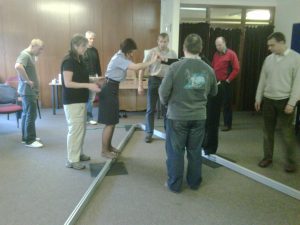
- The 5 Dysfunctions of a Team – Lencioni
- Assessing the functionality of our Team
- Understanding Team Dynamics
- There’s Leadership, Followership and there’s…CONFLICT!
- Experiential Activity: Trust Vee / Trust Me
Habit Two – “Begin with the end in mind”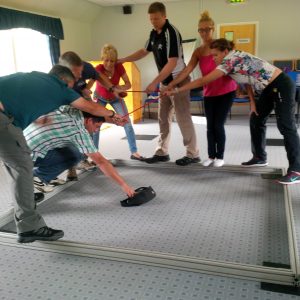
- Creating “buy-in” through Shared Visions using Appreciative Inquiry
- Increasing the level of Accountability in our Team
- Collaborative Working across Teams and Organisations
- Experiential Activity: Doctor Doctor!
Habit Three – “Put First things First”
- Creating optimised efficiency through prioritisation
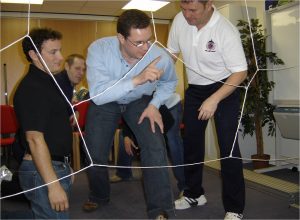
- The “important and urgent” analysis of what we do in our Team
- Where do most successful teams spend their time?
- Experiential Activity: Spiders’ Web
Habit Four – “Think Win-Win”
- Overcoming the Fear of Conflict on our Team
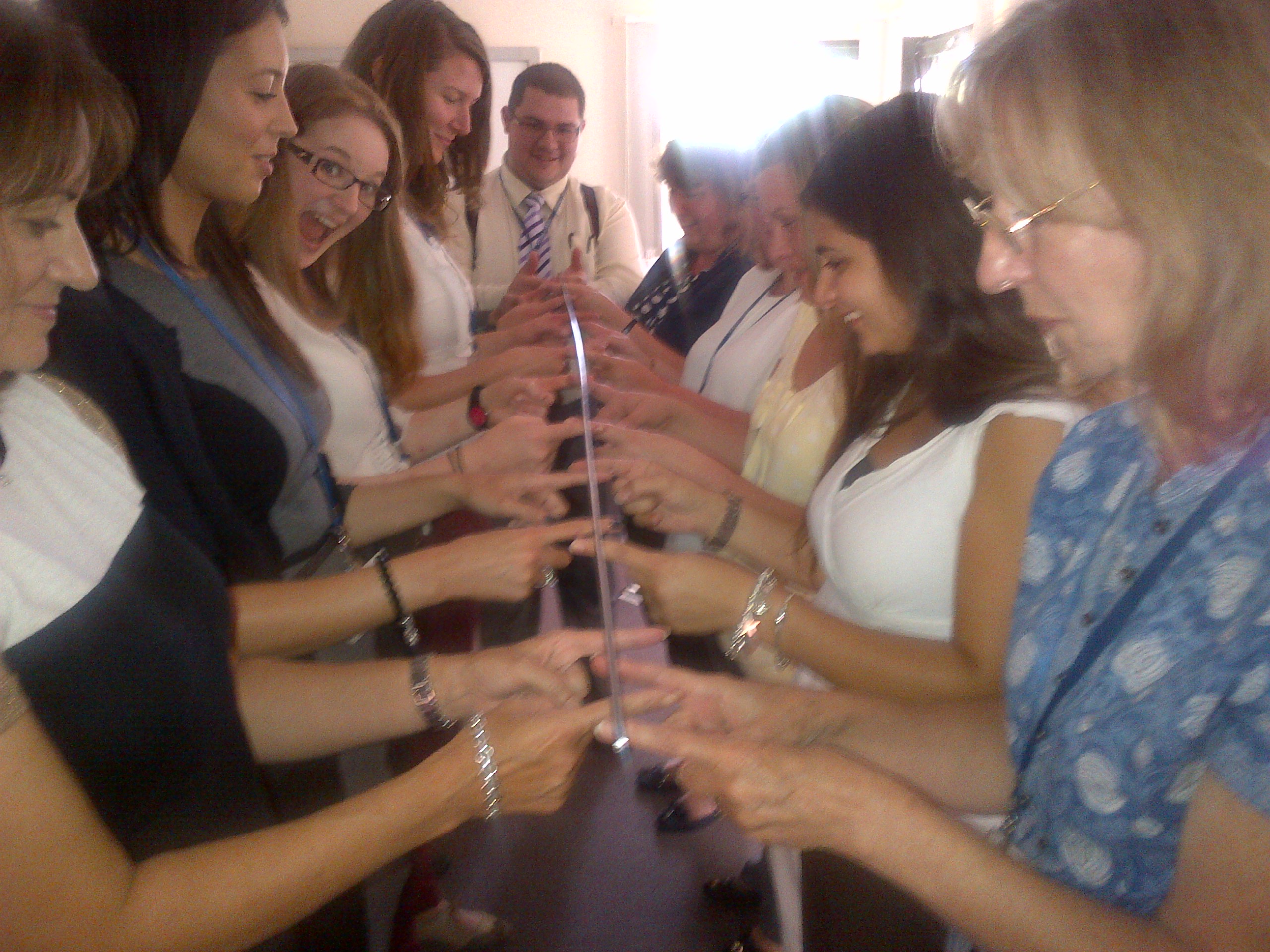
- Embracing Conflict in the Team
- Conflict Resolution and Management within Teams
- Experiential Activity: Levitation Challenge
mtceurope
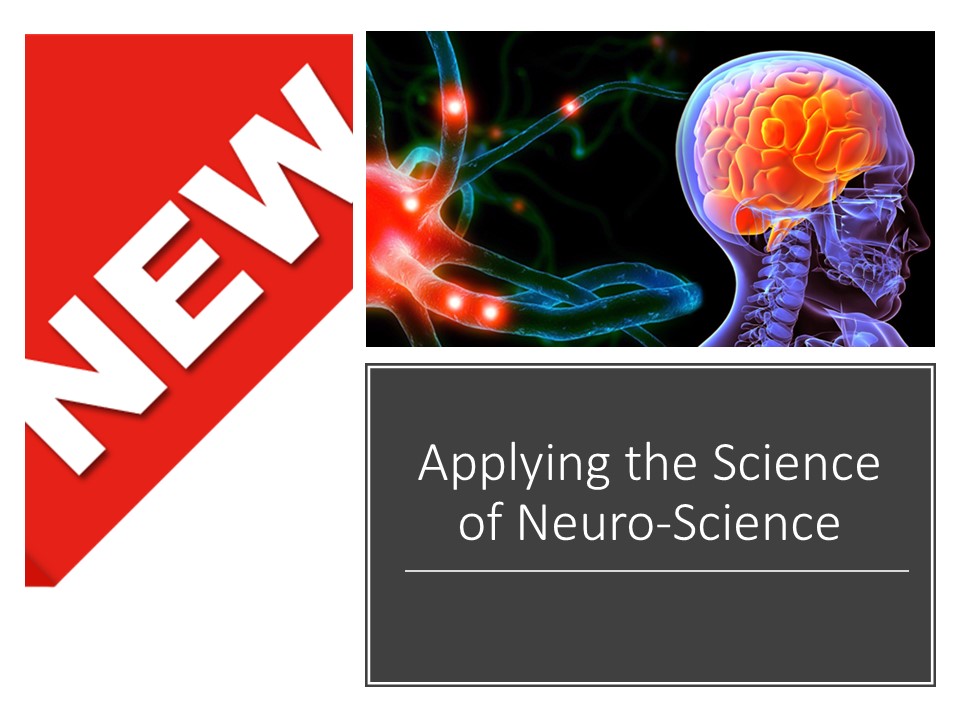
How Neuroscience Helps Us Understand the Mind, Brain and our Emotional Intelligence
Just as computers are hard-wired with electrical connections, the brain is hard-wired with neural connections. These connections link together its various lobes and also link sensory input and motor output with the brain’s message centres, allowing information to come in and be sent back out.
One major aim of current neuroscience research, then, is to study how this wiring works and what happens when it’s damaged. New developments in brain scanning allow researchers to see more detailed images and determine not only where there may be damage but also how that damage affects, for instance, motor skills and cognitive behaviour in conditions like PTSD, Stress, Performing under Pressure, our Emotional Intelligence and our overall, well-being.
This virtual workshop covers:

- Working through Trauma What is Trauma.?
- Trauma is simply trapped emotional energy from one’s past such as ones childhood or even a few months ago it gets stored in the body and thus becomes trapped emotions. Normally in a traumatic event, a huge amount of energy is made available in our bodies so that we can deal with that event.
- These energies take up space and distort the vibration where they are trapped, eventually leading to not only a disruption in the organs and tissue in that area, but globally in the whole body and often we become overwhelmed – shocked – and the energy that should be there to help us becomes frozen and stuck. Having ‘nowhere to go’, this trapped energy results in symptoms such as: exaggerated emotional reactions, and extreme mood-swings, Sleeping poorly, Panic attacks, Flashbacks and nightmares, Numbness and lack of feelings, Unexplained medical disorders, Muscle tightness and pain, Headaches, Chronic fatigue, Psychosomatic illnesses, Skin problems, Digestive problems, lack of motivation, depression.. etc.
- Managing The 5 F’s of Trauma: 5 hardwired responses to trauma: fight, flight, freeze, flop, and friend. In a moment of danger, these responses all happen automatically to try to keep us safe.
- Understanding the impact of the Kubler-Ross Change Curve – working through the 5 Emotional feelings of Grief
- Reframing our Thoughts – Positive Psychology / Thinking Tools
- Creating Winning Behaviours and Attitudes and a Positive Outlook
- Gaining the psychological advantage by applying neuro-science
- Building our Emotional Resilience
- Harnessing the power of the brain to increase Innovation and Creativity
- Improved Decision-Making Skills
- Developed Neuro-Leadership Skills
Today’s leaders need a deeper ability to communicate and influence in order to drive higher levels of accountability and productivity on their teams. In this highly interactive neuro-leadership training workshop, we will explore how neuroscience can be applied to leadership and challenge each participant to consider how embracing new leadership methods will enhance and support the rapid growth of them as individuals and of their Group / Team or Organisation.
Understanding the neuroscience behind making a decision can be helpful when targeting new behaviours and changing bad habits. When you reach a fork in the road and need to make the right decision for your long-term health and well-being, using the brain science behind decision-making is a useful tool.
Decision-making is in the locus of your control. You have the power to break patterns of behaviour simply by making better decisions. You can change your mind and your actions at any time. Even when you’re stuck in a cycle of rut-like thinking and behaviour, a change of attitude and decision-making can turn your life around.
Keep taking your self-medicated Happiness Pills!
YES!…you really CAN improve your well-being and happiness by neuro-discipline by educating your brain to produce these mood-changing chemicals… on-demand
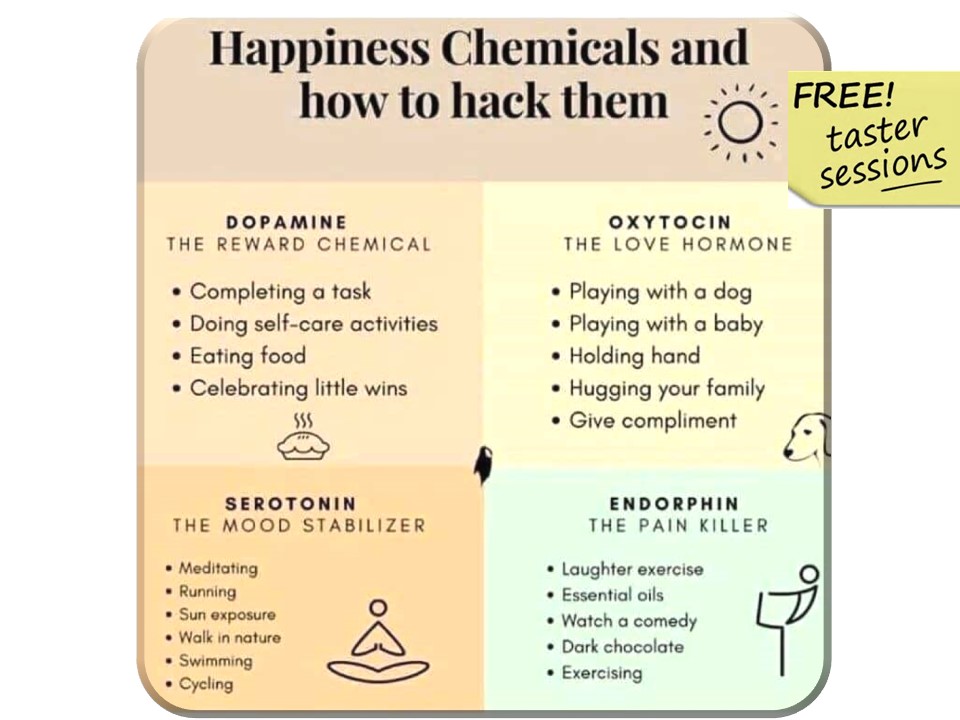
For further information, please call us today on 0844 745 2120 or contact us by clicking below
mtceurope
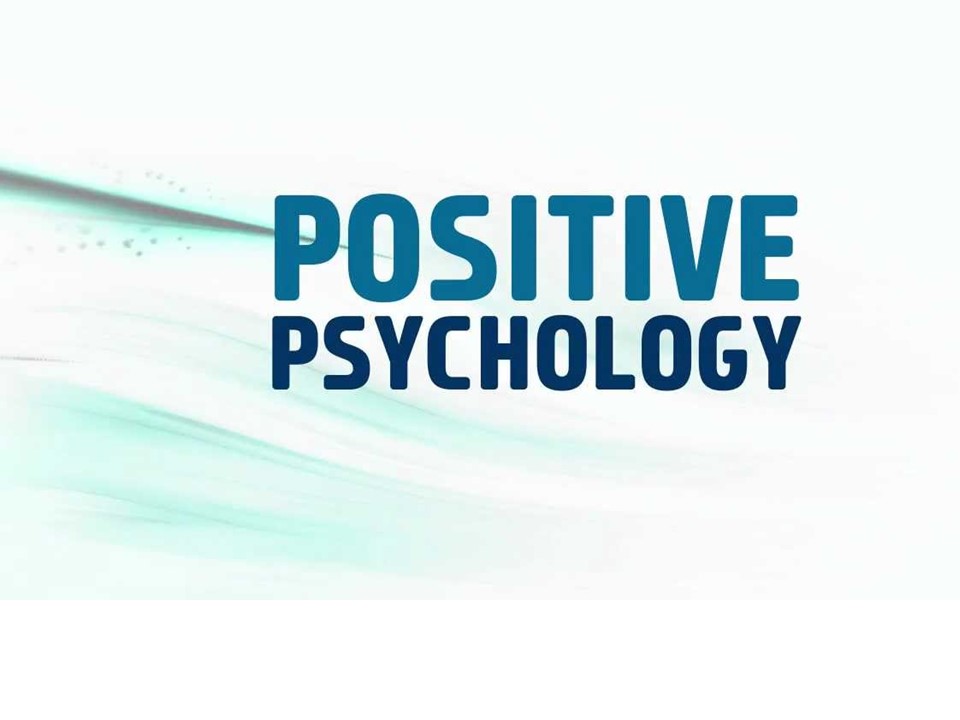
“Positive psychology explores what enables individuals and societies to flourish.
It examines how people can cultivate happiness, strength, and resilience, and ultimately live a fulfilling, meaningful life.
Rather than trying to alleviate suffering, positive psychology strives to enhance well-being. Positive psychology is a relatively new discipline, but it has grown widely since its emergence.”
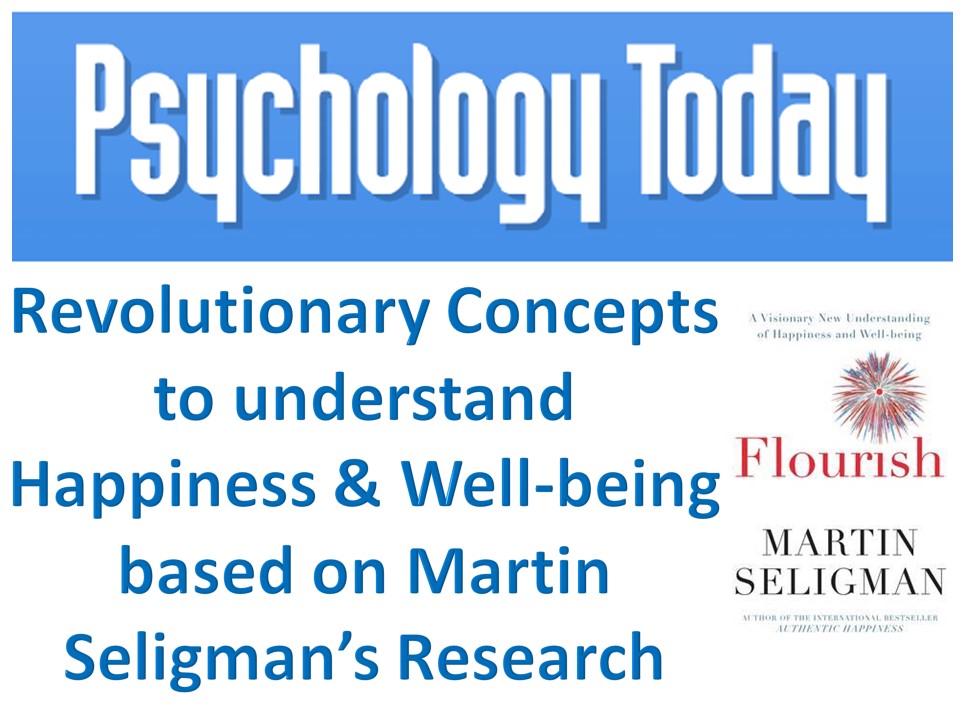
You will learn how to apply Positive Psychology to both your professional and personal development. These include:
- How to apply APPRECIATIVE Inquiry concepts – looking for the “what IS working well?”
- How to develop Stress Resilience
- How to build Resilience
- How to be Happy
- How to improve Relationships
- How to identify and use Personal Strengths
- Applying the power of Positive Emotions, Happiness and Wellbeing
- Strategies from the theory of Hope and Goal Setting
- The importance of a Growth Mindset
- Developing Winning Behaviours and Attitudes
- Living “Above the Line”
Are you getting enough of your “Happiness Chemicals”?

Course overview
You will learn leading-edge techniques to develop strengths and virtues such as wisdom, self-control, courage and fairness. You will also learn about ‘beyond’ mindfulness, Seligman’s PERMA concept and compassion and how to be more self-compassionate.
In the early days of Yorkshire soprano Lesley Garrett’s stellar career, she found it difficult to ‘break into’ the world of music.

She moved to London, hoping to find her first career break – but quickly found that the streets weren’t paved in gold after all. Despite, setback after setback, Lesley wrote to her Mum back in Yorkshire every week listing all of the potential opportunities that each week was bringing…only to write again the following weekend to update her Mum that none of the opportunities had been successful. One weekend, Lesley received a envelope from her Mum…when she opened it, she found a handful of dirt together with a brief note saying…
“…it sounds as though you’re in need of some Yorkshire Grit…so I’ve sent you some!…

So, if you feel YOU need some ‘Yorkshire Grit’ to help you get through your business or personal life right now… why not click below and book yourself onto a Zoom Coaching call with in one of our facilitators – from £35.00 + VAT per module.
mtceurope
Personal Development for Traineeships and Work Experience Opportunities
Whether it be our children or our Young People whose lives have been challenged by Covid-19, the application of the principles of Emotional Intelligence and Positive Psychology can provide a healthy emotional and wellbeing character in all ages.
If it is the equipping of our young students for examinations and career choices or creating ‘work-ready’ Trainees and Students for the Workplace, our wellbeing, stress resilience, emotional intelligence and positive psychology interventions can equip a Student to become “work ready” and our Coaching of the Student can be continued at their work experience employer – ensuring winning behaviours and attitudes.
Contact us today to hear about our CPD accredited Young People Personal Development programmes.
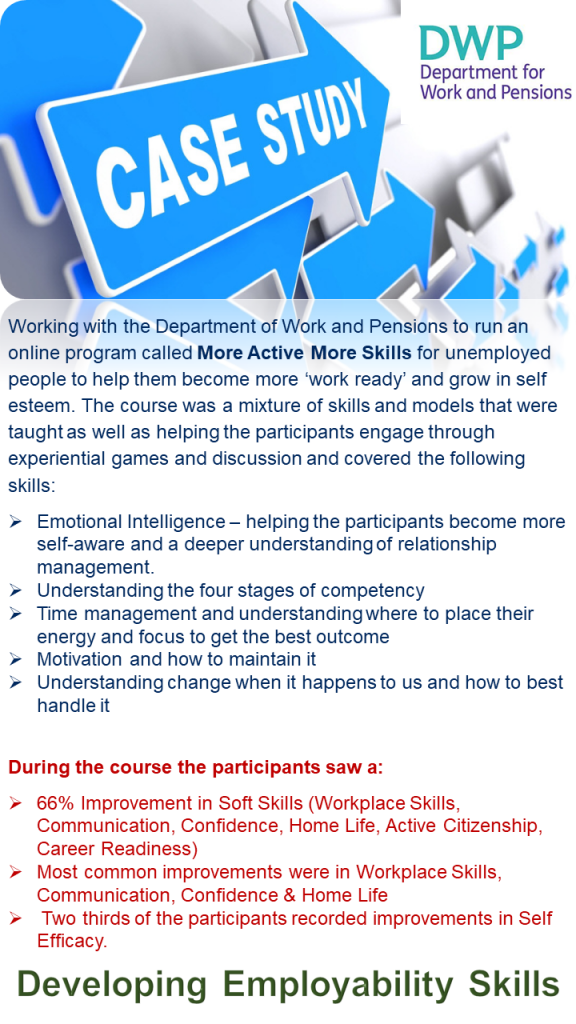
Click Here for an overview of our Employability Programme
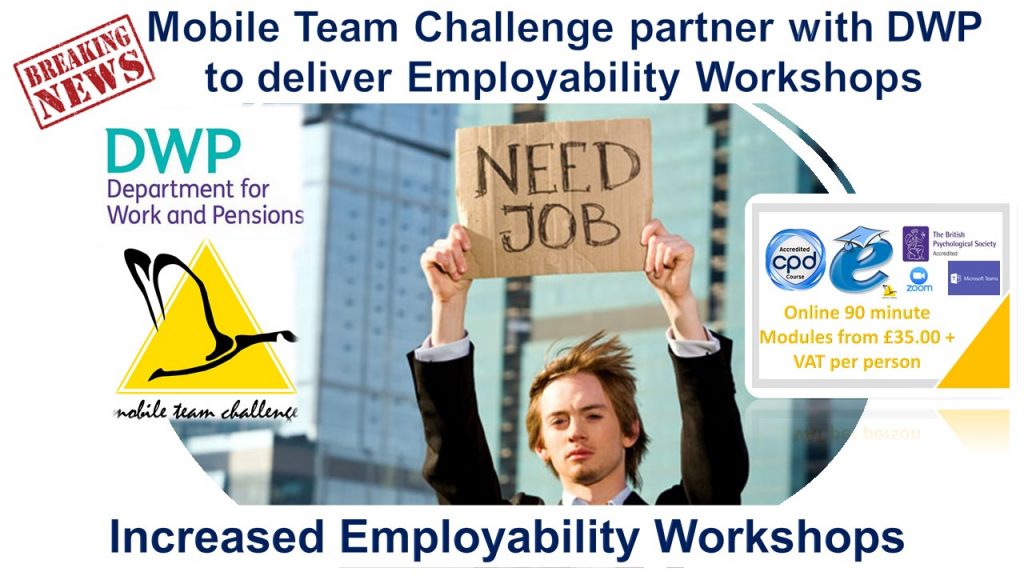
Increasing Employability Skills
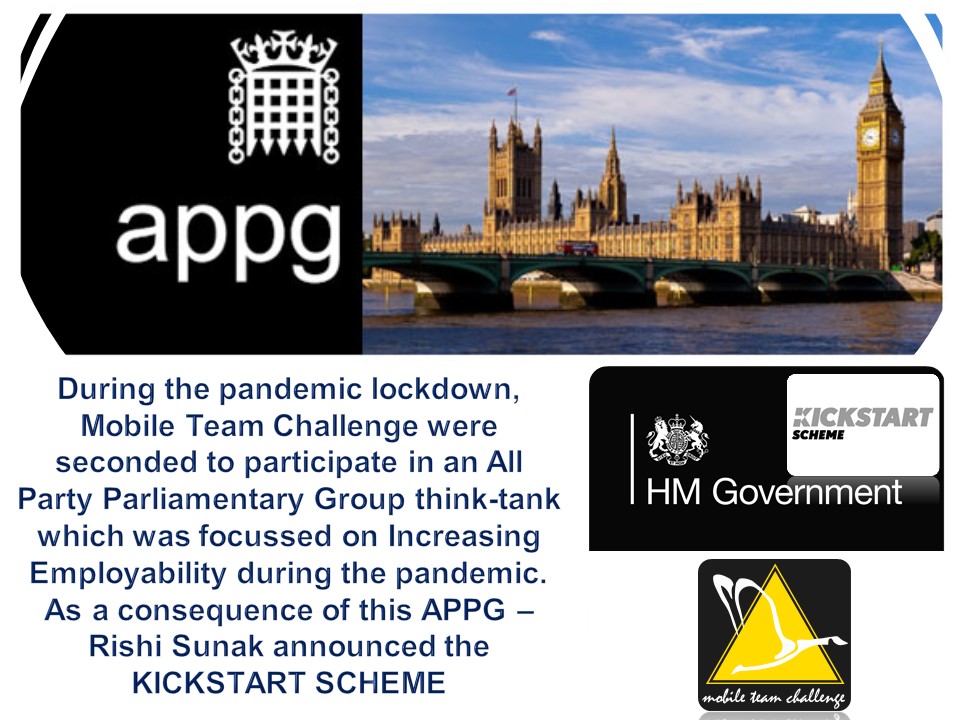
Mobile Team Challenged have been seconded onto an All Party Parliamentary Group Think Tank to discuss the growing concern of Young People unemployment. In the light of Covid-19, Government statistics are suggesting that “unemployment within 18-25 year old could be as high as 2 million by the end of 2021”. There is also a concern over the forecast that “we are expecting a tsunami of well-being and mental health issues” as the circumstances accumulate and leave our young people facing a “perfect storm of negative influences”. The Group is hosted by MP Barry Sheerman and Chaired by Simon Kelleher, Head of Education & Skills and is tasked with creating an implementing strategy for the Chancellors’ Kick Start Job Scheme .
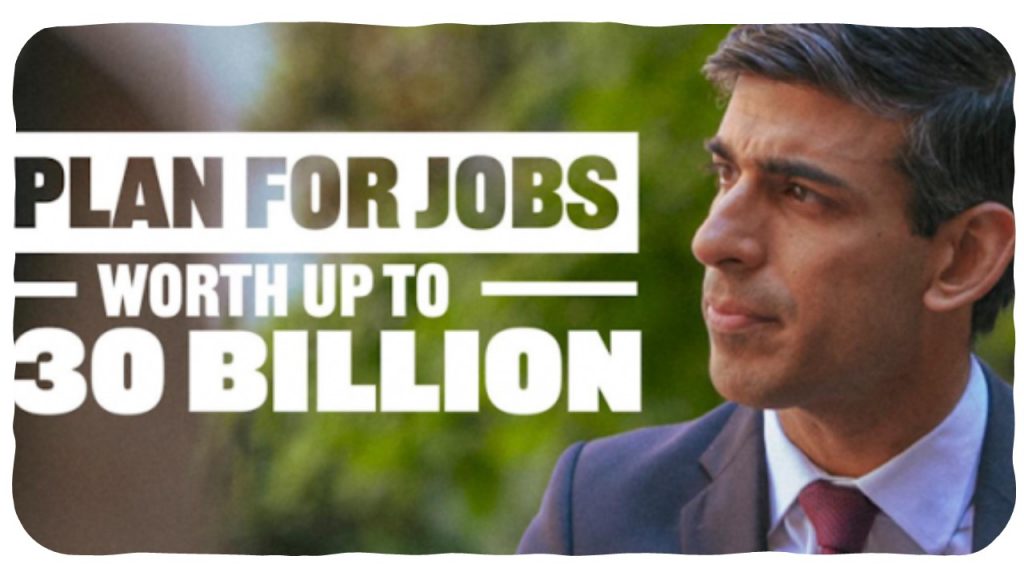
It is becoming critical that we help mitigate these effects by developing the “employability skills” within the Young People looking for Apprenticeships and Traineeships (as per The Chancellor’s KICKSTART programme) – and as SME’s, Business Owners etc it is vital that we CREATE opportunities within our Organisations to offer our Young People an opportunity to take a first step on their career journey by offering them employment. Mobile Team Challenge are currently coaching Students to get them “work ready” in Colleges, Universities and DWP initiatives – and are offering on-going support and coaching for them to every employer who takes on a young person. Contact us for details.
Preparing Students for Work Experience and Placements
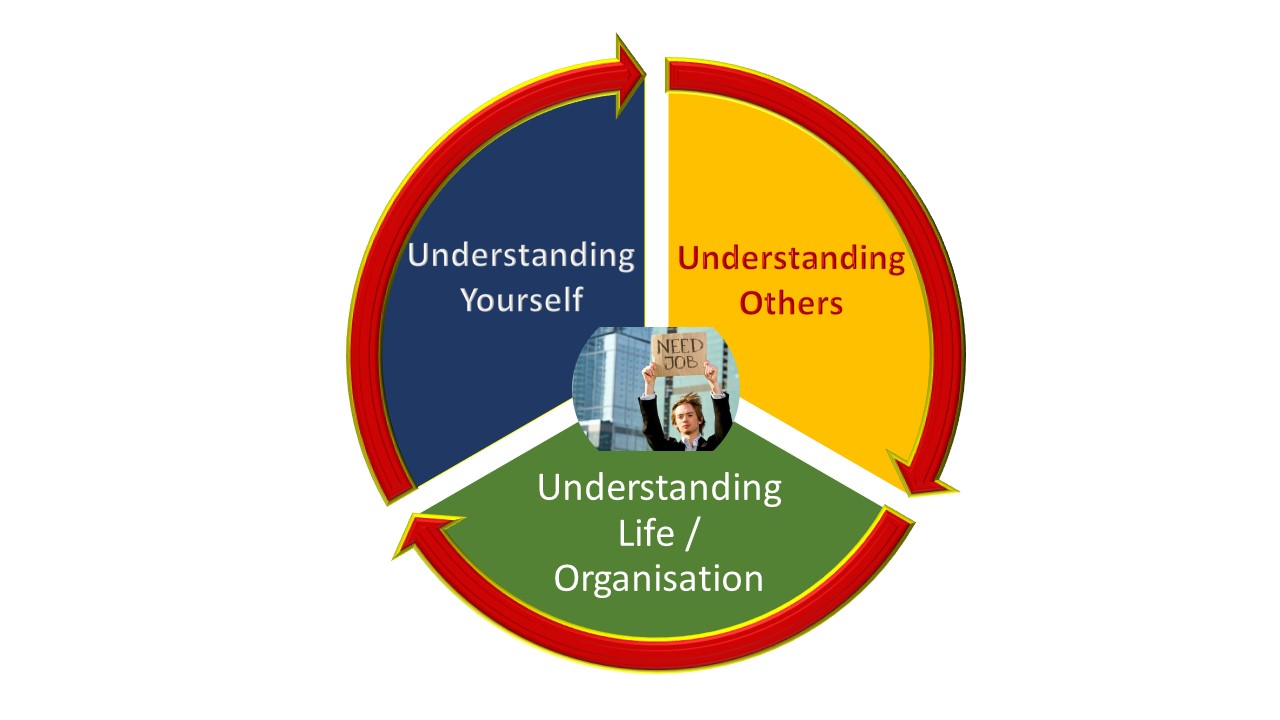
Bridging the gap between “Student Life” and “Work Life” can be a significant challenge to a Student entering the “commercial world”. The transition from “Student Mind Set” to those required in the world of Commerce can be immense. Whilst many Students, prior to Work Placement or Full Time Employment, will have experienced an element of ‘team-working’, ‘shared visions and corporate goals, vision and mission statements and ‘lower-case p’ Politics, the immersion into a commercial world takes these to the next level and can sometimes be over-whelming to learn how to thrive in their new cultural setting.

Our online programme is the perfect preparation for any student about to embark on work placement interviews or full time employment. The application of emotional intelligence and the social skills covered in this programme will be invaluable to the Students to support them in the transition. Through the development of Self-Awareness the Students will embark on a journey: Understanding Yourself – Understanding Others – Understanding Life / Organisation and Daniel Goleman’s Emotional Intelligence concepts are key to a successful transition from ‘academic to commercial’.
Click Here to see a Sample Programme – we would be happy to create a programme specifically for your students
The Emotionally Intelligent Student
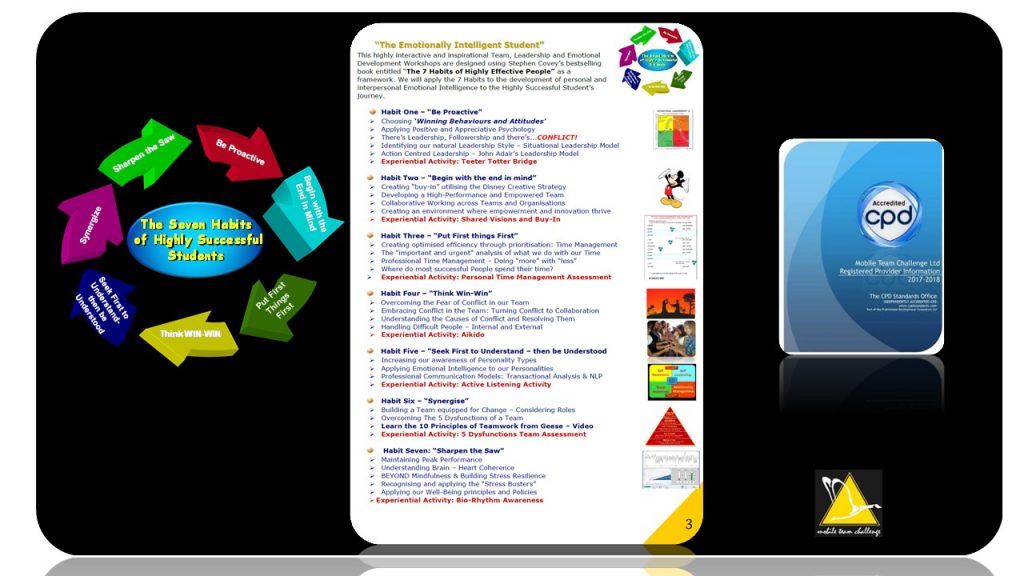
Universities Challenged!
Delivering Student Experience Excellence at your University / College
Are you providing “Value for Money” for your Students?
The current squeeze on funding, the increase in competition, the greater demands for excellence from Students who now have a greater choice where to gain their education, revealing NSS league tables, the increasing fees – all demonstrate that the Further and Higher Education Sector has possibly never known such “extraordinary times” as those in which we are living today – confirmation then that “extraordinary measures” are required.
As Universities across the Country begin to focus more on commercial strategies as the competition increases it is vital that your University delivers Service Excellence and outstanding Student retention and satisfaction levels in order for their offering of further education to remain competitive and for the students to perceive that they have received good “Value for Money” in the face of Students fees increases.
In a competitive Higher Education Market, it is essential that any differentiator of courses offered or product is leveraged to its maximum in order to gain the advantage.
When services and products become similar – it is the excellence of the Service offered which plays a major deciding influence. But when the day arrives when every University offers Student excellence – it will be the Universities who can offer the “next level of service” who will sustain their success.
It is their experience which Students will remember and talk about to others.
This Workshop focuses on how to apply Disney’s culture of Service Excellence into our Student’s Journeys. It covers an in-depth analysis of every “Moment of Truth” where a Student or a Potential Student can form an opinion of your College or University based on their experience and it prepares a strategic “Analyse, Fix / Improve, Measure” process of Student-Facing activities in order to ensure Student Experience Excellence. The workshop looks at WHY? Disney has won the award for Best in Class for Customer service for over 30 years. We explore the Principles of the Magic Kingdom and take in the award winning FISH! video as we focus on Student Experience Excellence. Delegates will compete a Service Improvement Plan during the workshop. Creating a Culture of Student Experience Excellence What IF ……. Disney ran your University?
Disney has won the “Best in Class” Award for their Customer Service Principles for the last consecutive 40 years
Now these principles are delivering excellence within Further and Higher Education Establishments across the UK
Measuring your Students Experience – NSS The “bar” for Student Service Excellence and Experience is getting higher each year for Universities to achieve.
The Higher Education Funding Council for England reported that: “Students are more satisfied with their experience at UK universities or colleges than at any time in the eight years of the National Student Survey (NSS), with 86 per cent saying they are satisfied overall with their course in this year’s survey.”
This inspirational and motivational 1 day workshop will explore:
- The 10 Things that Disney would do differently if he ran your University
- The 9 Principles of Service Excellence – How does Disney “DO” Customer Service?
- The 6 Keys to the “Magic Kingdom”
The workshop will be interactive with group and experiential activities
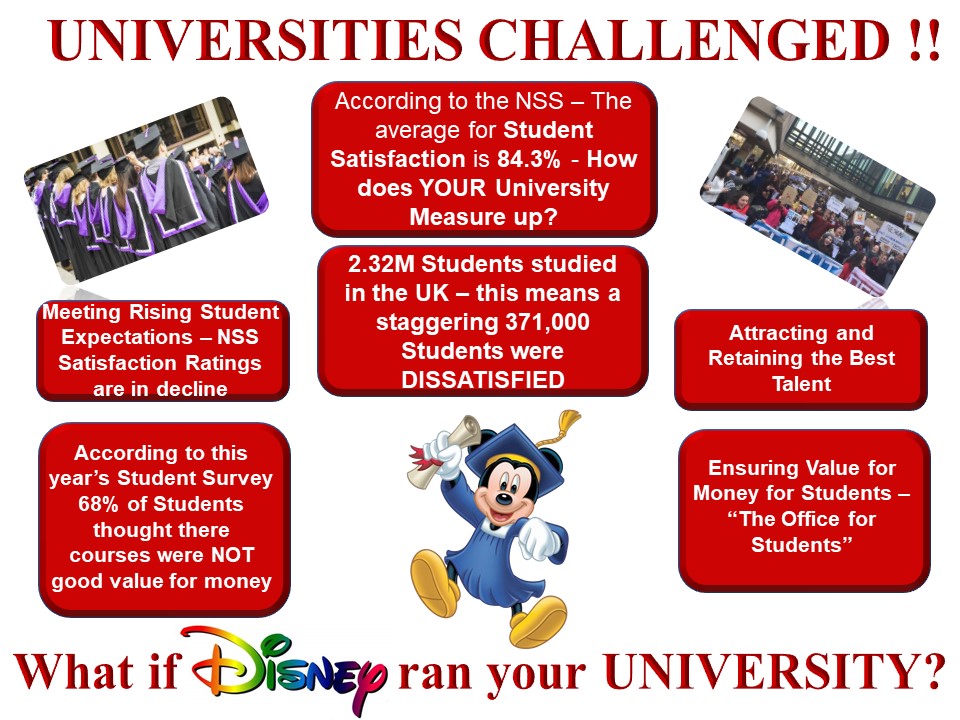
Doing it like Disney – Universities Challenged!
Workshop Agenda
What if…we did things Differently? …and What if…Disney ran your University?!
- Who are your ‘Customers’ and the Stakeholders of your University?
- Who are your Competitors?
Experiential Activity: Paradigm Shifter – Thinking Differently about Student Service
Seeing Your University through the eyes of a Student
- “Moments of Truth” – Jan Carlsson SAS – We only have ONE opportunity to make a FIRST Impression on our Students…what would their first impression be?
- Identifying our Competitors and our Clients / Partners
- How do our “Touchpoints” impact our Students’ “Moment of Truth”?
- Seeing our University through the eyes of our Students.
- Identifying areas for improvement for Student Satisfaction within our “Touchpoints”
- Is our University really offering “Value for Money” to our Students?
- Self-Audit – How does our University measure up now? – Current State
- Creating a Culture where Kai-Zen (Continuous Improvement) Thrives
Group Activity: Student Touch-Points – Mapping the Student Experience
Sprinkling the “Magic Kingdom” Dust: Disney’s Service Principles
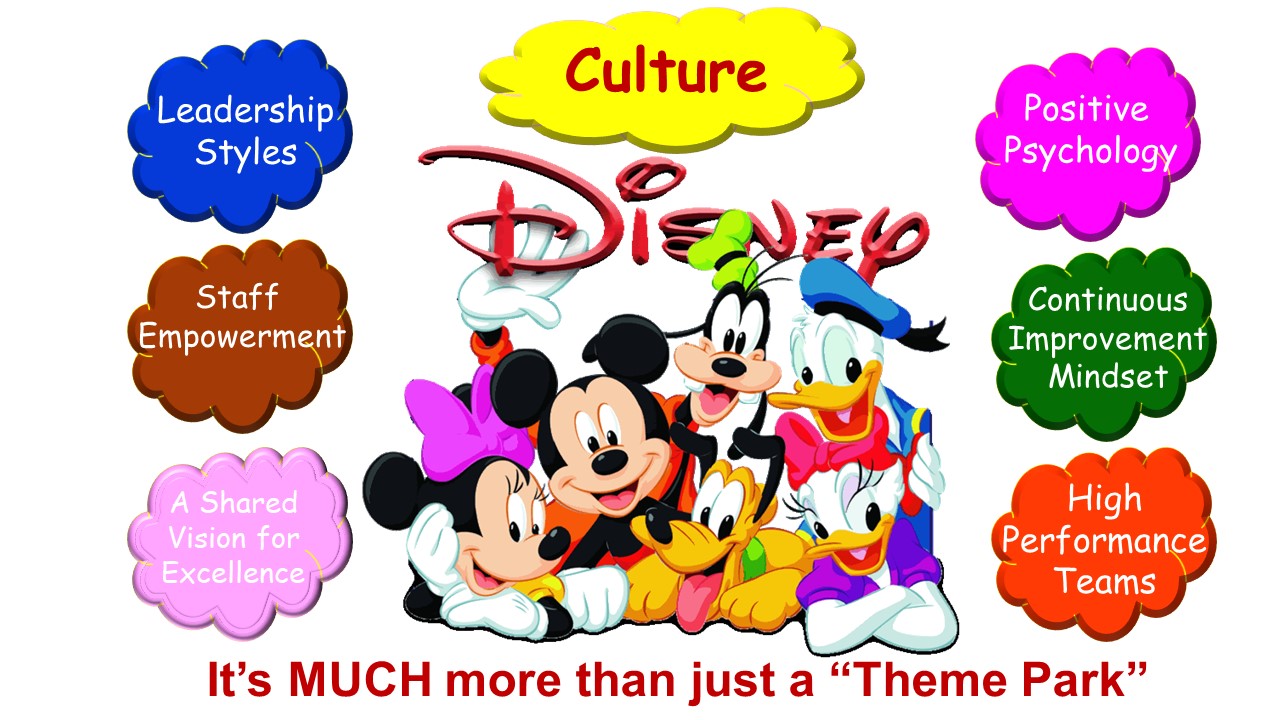
- The 10 Things that Disney would do differently if Disney ran your University
- Disney’s Award Winning’ Service Principles of Service Experience Excellence
- What are our Service Standards for “Student Experience Excellence?”
- How do our OWN Levels of Service Excellence Stack Up??
Group Activity: A Self Audit
Creating a Culture of Innovation and Service Excellence within your University

- How DO those guys do it? – Best Practice Principles of Innovation
- Apple / Nike / 3M / HP / Disney / Harvard
- Defining and applying the 3 ingredients of REAL Innovation into your University
- Apollo 13 – Definition of Innovation – Video
Student Experience Excellence requires Functional Team Working
- The 5 Dysfunctions of a Team – Working as a Functional Team for our Students
10 Lessons of Teamwork – from The Geese – Video
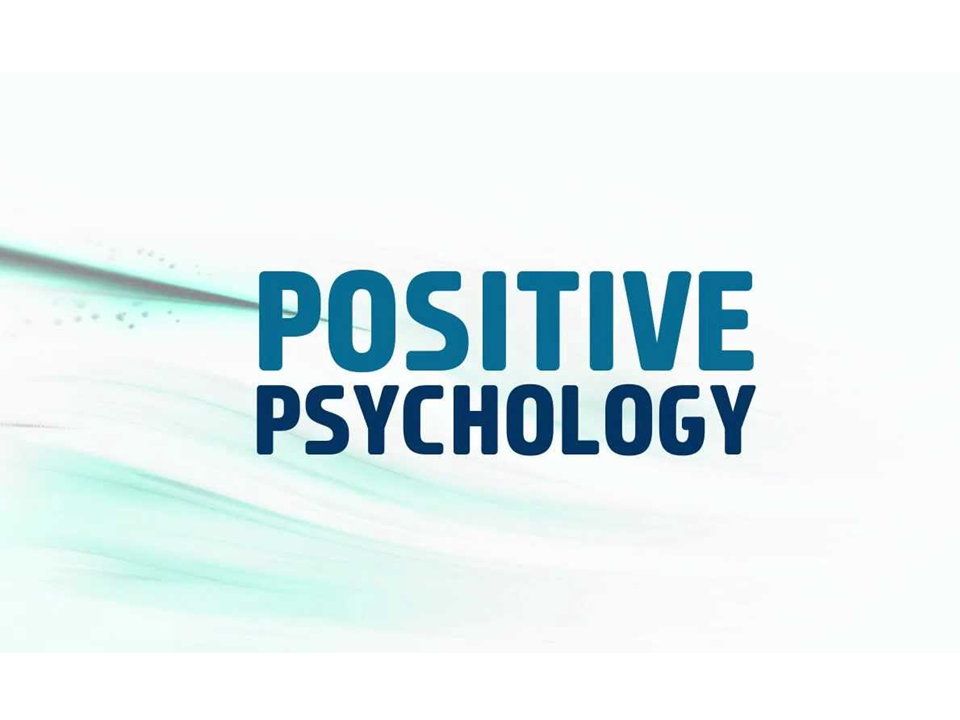
- Applying Winning Behaviours and Attitudes to our Student Experience
- DeBono’s Thinking Hats – Understanding Challenging Personalities
Experiential Activity: Levitation Challenge
Identifying and Understanding Personality Types
- The ABC of Managing difficult Student Behaviour
- Transactional Analysis, Neuro–Linguistic Programming: Professional Communication Techniques
Experiential Activity: Navigating the Impasse
Designing the ’10 out of 10′ Student Experience of Excellence at our University
- Utilising the Appreciative Inquiry and the Disney Creative Strategy to design a Student Experience of Excellence. Delegates will map the Student Journey of the Future and will identify specific ‘Improvement Projects’ for the delegates to be involved with and to implement post-workshop.
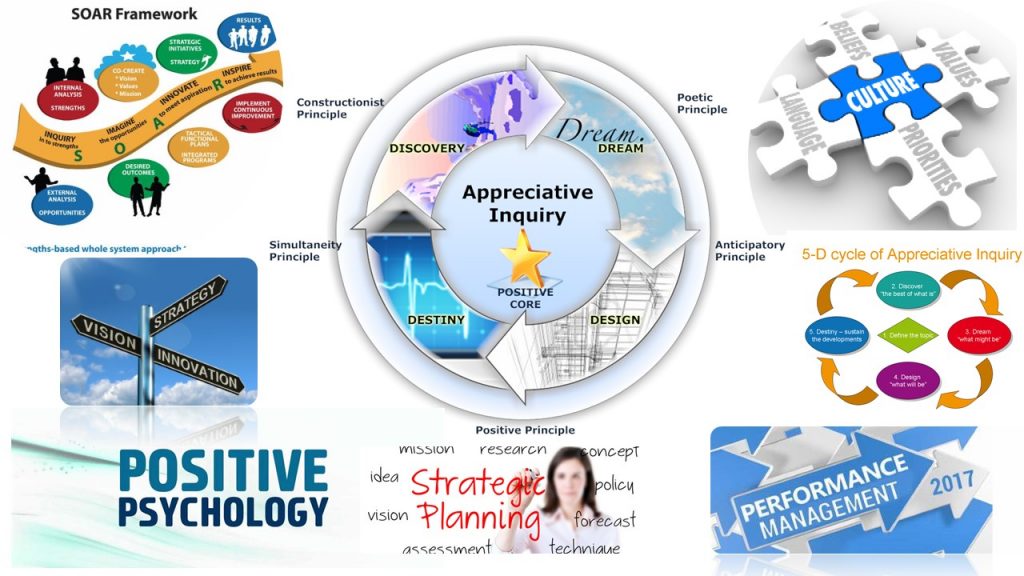
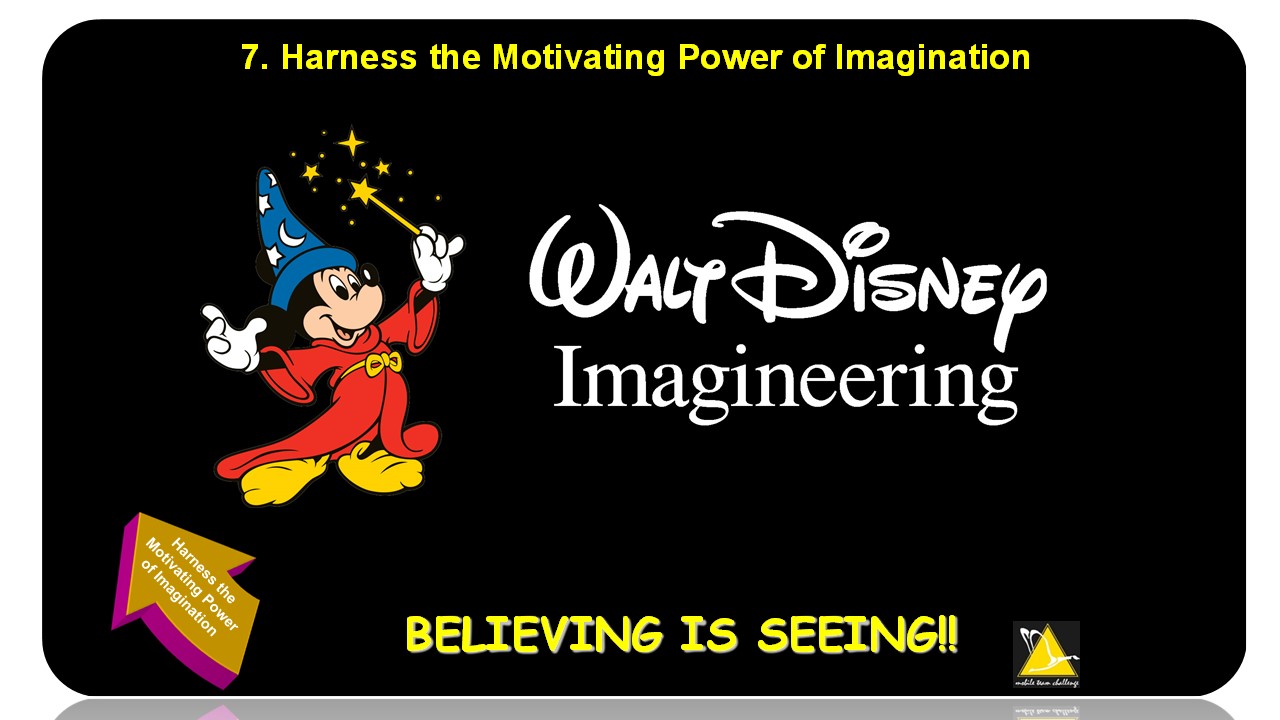
What does Student Service Experience Excellence Look Like?
- The Disney Creative Strategy – designing the Perfect 10 Student Experience Excellence
- Dreaming the Student Service Experience of Excellence
Group Activity: The Perfect Student Experience Excellence Outcome – Future State – using Appreciative Inquiry
The 4 Principles of Achieving the Student Excellence Experience – FISH! DVD
- Choose your Attitude
- Play!
- Make their Day
- Be There for them
The FISH video / DVD has gone on to be the best selling training video/DVD of all time. Here is an extract from the Pike Place Fish web site: “For us it means going beyond just providing outstanding service to people. It means really being present with people and relating to them as human beings. We take all our attention off ourselves to be only with them…looking for ways to serve them. We’re out to discover how we can make their day. We’ve made a commitment to have our customers leave with the experience of having been served. They experience being known and appreciated whether they buy fish or not. And it’s not good enough just to want that – it takes an unrelenting commitment. We’ve made it our job to make sure that experience happens for every customer.”
These same FISH! Principles are now being applied to Universities and Colleges throughout the UK
Click Here for a Preview of this Award Winning Video – FISH!
Workshop Outcomes – Delegates will:
- Be inspired and motivated to shift their personal paradigm for Student Experience Excellence
- Consider your University through the eyes of a Student and create an Action List of improvements
- Learn the 3 vital ingredients to create a culture of innovation within your University
- Learn the 10 things which they would do differently…if Disney ran their University
- Explore Disney’s Principles of Service Excellence and Continuous Improvement and learn how to apply them to their University
- Create the “perfect Student Experience Excellence service” utilising Appreciative Inquiry Planning tools
- Learn how to build and/or contribute to high performance teams within the University
- Consider the relevance of breaking down silos in order to achieve Student Experience Excellence through the efficiency of Functional Teamwork
- Complete a Self-Audit of their own perceived Service competencies
- Explore Professional Communication Tools to enhance Student Service levels
- Consider the Service Principles of FISH! – the Award Winning DVD on Service Excellence and apply them to your University
- Be awarded with a CPD Certificate in Customer / Student Experience Excellence
Click here to download an overview of this inspirational workshop: Creating Student Experience Excellence.
The cost of this module is £895 + VAT for groups of up to 12 delegates. This cost includes all preparation, materials, workbooks and trainers expenses.

The above workshop is also available on-line and is delivered over Zoom or Teams over 4 x 90 minute sessions
Click Here to see the online Zoom format
